#Since otherwise they would be nameless background characters so I might has well give them names and lore
Explore tagged Tumblr posts
Text
A bit more of world building with a possible OC, White-Naped Crane focused.
I know that I mentioned in a previous world-building post that the White-Naped Cranes were part of a ruling priest class, in the old Joseon style species caste system, that was overthrown generations ago in my AUs.
The caste system is based around the idea of Confucianism, with the ideas of ritual performance and piety towards a leader. This is combined slightly with Shamanistic and Hindu values that somewhat did influence the traditional Korean values, that hold that an authority figure should make rules and laws for the good of the family/community, all turned into a religion that held the caste system and separation of species as holy.
Although, whether the cranes fully worship this idea, or just want to reclaim the power they used to have, is a mystery they keep to themselves.
In real life, White Naped Cranes live in the demilitarized zone of North Korea, but will migrate to other countries each year, primarily to Japan, where they depend on a specific sanctuary to feed them.

(White-Naped Crane migration distribution)
I find that it does make sense for the majority of the population of White-Naped Cranes to go to Teikoku (Japan) during their migration, since the kingdom there would welcome the Cranes due to shared shamanistic beliefs, as well as possible information sharing about Flower Hill. Flower Hill doesn't necessarily like this, but the White-Naped Cranes are traditionally from Flower Hill, so for diplomatic purposes and migration rights, they are allowed to stay for now, even if they do run large temples in the south of the peninsula that the weasels flock to. Besides, their ability for Opera performances is superb at festivals (very popular in North Korea).
Their migrations have them bring back strange, new ideas of subservience to emperors and the old caste system, and they cause enough disruptions with their preaching that Flower Hill considers revoking their traditional permits to come and go as they please.
The carnivores in the south still believe that they are superior to smaller animals, so the cranes' preaching is more welcome there. Especially since Teikoku left a few colonies down there.
Which brings up the concept of migrating species that I will have to figure out, but I assume such travel will be allowed unless it will be too dangerous. There are small birds in the show that appear non-sentient at first glance, since they don't wear clothes, but they can also talk and participate in festivals.

But most of the migrating species in Korea do appear to be the cranes. Ducks migrate as well, but I assume that the ducks in the show have eschewed that tradition since they are part of the navy.
So, I have created the leader of the White-Naped Cranes, Chongsu (Superior/Supreme leader). She is also a mudang shaman who participates in traditional rituals, as much as Flower Hill participates in those other than enjoying operas. Since the role of such a leader is hereditary, her father (late note/edit: traditionally it is passed down through the women, but I was looking at a source invving the group that has it through the men at the time, because there is that group. But if you add in Confucianism and Buddhism to the mix it works. Also this was the start of the idea anyway) was the previous leader, who passed away due to a mysterious illness. However, she is rather young, and also sickly, so cannot leave her temple for long periods of time, and certainly not without an escort.

(I'll find an OC generator that does cranes eventually. Or I'll just draw one myself)
Her biggest wish and command is for all races and species to get along with each other. What she does not realize, is that as the supreme leader, this could possibly be misinterpreted as a command for her people to reinstate the caste system, by any means possible, which could even mean teaming up with weasel or tiger leaders who also wish to return to the caste system.
As the leader of her group, she does occasionally have to meet with the Commanders of Flower Hill, but is sickly enough that the higher priests that serve as her guards often speak for her.
This makes the Flower Hill Commanders very suspicious of the White-Naped Crane population, because after all:

The Commanders are very aware of the power she wields over the White-Naped Cranes, and that she could be manipulated into giving orders to perform hostile actions. They just don't know when it could happen, but assume it will due to their friendly relations with the enemy. But ordering the Cranes to stop leaving the country, investigating their loyalty, or ordering them to leave since they do share more beliefs with Teikoku than Flower Hill, could be seen as an illegal purge or discrimination towards a minority group by the international Hague courts, which would get Flower Hill in trouble and decrease support.
Since I am roughly using the world map as seen in the show, I am making up some names for countries that are somewhat related to the country and culture. Also, mostly focusing on countries that have strong relations with North Korea, both good and bad.

I will be going with the idea that Rabbit Village is China. The police work with Flower Hill in capturing 'escaped criminals.'
Chaand Hadia (Moon Gift) is Pakistan. This country has a close relationship with North Korea in real life, to the point of smuggling in nuclear weapons.
Japan will be called Teikoku (Imperial State/country). They have tried to take over the Peninsula in the past, but an internal civil war and economic strife forced them to leave their colonies behind.
South Korea, with the weasels, I would think would be the colonies left behind, which still believe that Teikoku want them to take over Flower Hill, and possibly the continent. However, since the ideals and culture have drifted away from proper Teikoku values, it is unknown if their parent country wants anything to do with them. I have decided to call the country Usuhan Jiyeog (Superior Area/Territory). They also believe in weasel/carnivore superiority, and thus see Flower Hill as weak, and ripe for the taking.
Supposedly, the Wolf Unit represents America, to the point that US can be seen printed on merchandise in relation to the wolves. So I guess I'm calling the country the wolves came from the Unites States Alliance.

Jindo Dog Island (or Jindo empire), is an actual place. It is the only location that has the authorization to breed the National Korean Jindo Dog. The waters there can be very dangerous, so it makes sense to turn it into a powerful nation.

I also made up a country named Chambelli Koh, which is Urdu for Flower Hill, which will be used for a different AU. Although it could be used by both Flower Hill and Chaand Hadia as a buffer zone, since any invading weasels coming from that angle would take over that small country first.
#can it work in the canon of the show? Is the rule for this until I write the hyena AU#I'll mix and match what I want as long as the research into both North Korea and Squirrel and Hedgehog matches up well enough#nameless background characters doing important things supports OCs having small roles I guess#Since otherwise they would be nameless background characters so I might has well give them names and lore#And do other AU stories with them later#Like no one else wants certain characters in the show to have happier endings#or be the hero of another story#what happened to the mouse? Indeed...#I should create a side-blog to store all the world-building posts or something#then I wouldn't have to offer explanations under the cut#squirrel and hedgehog#sah#SaH#sorry for the rambling I'm a bit off today#I still have to figure out India#but it doesn't appear to have a big impact with North Korea other than keeping peaceful diplomacy
2 notes
·
View notes
Video
tumblr
The Untamed/陈情令 Rewatch, Episode 6, Part 1 of 2
(spoilers for everything MDZS/Untamed and a little for Princess Weiyoung)
[covers MDZS chapter 18 and a bit of chaps 56 and 66]
WangXian meter: 🐰🐰🐰🐰🐰🐰🐰🐰🐰🐰🐰🐰🐰🐰🐰🐰🐰🐰🐰🐰🐰🐰🐰🐰🐰🐰🐰🐰🐰🐰🐰🐰🐰🐰🐰🐰🐰🐰🐰🐰🐰🐰🐰🐰🐰🐰🐰🐰🐰🐰
(a 🐰 is earned every time there is a WangXian scene or even when they’re just thinking of each other…there’s so much Wangxian-ness in this episode, one post couldn’t contain all of it)
Team CQL went rogue for the two major events featured in this episode—the Cloud Recesses drinking incident and the WangXian bathing scene—and really, bless them and their ancestors for that decision. Not only did the changes provide Wei Ying and Lan Zhan with additional bonding time, but they actually had significant bearing on future events.
Originally in the novel, Lan Zhan didn’t actually partake in the drinking incident that got Wei Ying punished: some nameless disciples, Nie Huaisang and Jiang Cheng were the ones who actually took part in those activities. Lan Zhan only found their drunk asses the next morning and dragged Wei Ying off for disciplinary action (although, from the way the scene was described in the book, it actually seemed like he was more angry at Wei Ying for looking at porn, lol). However, for the live action, that entire scenario was transformed into Lan Zhan actually getting drunk for the first time, albeit against his will. Of course it would have been better if he willingly joined in, but at that point in time, that would have been illogical, not to mention completely out of character for him, so even though Wei Ying sort of did Lan Zhan wrong, there was probably no other way he could have gotten him to share a drink with him otherwise.
I am especially grateful for this change because that is the moment when my eyes were finally open to Wang Yibo’s talents as an actor and I started to really appreciate his performance. Prior to this episode, I was actually wondering if he was playing stoicism so well because that’s really all he was capable of doing, but then, when he dropped that rigid façade and gave us a charmingly adorable drunk Lan Zhan, I realized that everything that came before were indeed acting choices, that he was definitely able to do more than that. Not to mention, he also had pretty good comedic timing. I started to look at him in an entirely new light after watching this episode, and the rest is, as they say, history.
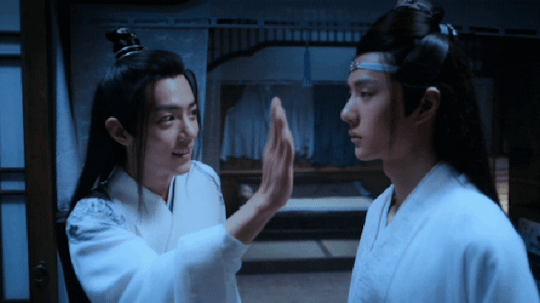
Upon revisiting this episode last night, I finally realized something that I never thought of before, and I feel actually pretty stupid for not even making the connection until now. During the Koi tower scenes in the present, when Wei Ying as the paperman was eavesdropping on Jin Guangyao and his wife’s conversation, I couldn’t figure out how JGY was able to put Qin Su under his control the way he did, but in watching this episode again, it finally came to me: he probably used a modified version of the charm that Wei Ying used on Lan Zhan in here. After all, JGY was one of the many people who raided the Burial Mounds and took over the Yiling Patriarch’s possessions after his death, so it would make sense for him to discover this particular memento as well. When I first watched this episode, I was mainly just impressed by how powerful the charm is that it would be able to put someone like Lan Zhan under its spell, considering he’s not just some lay person, but rather someone who already had a pretty high level of cultivation by then. I simply saw it as yet another indicator of just how talented and powerful Wei Ying was even at that young age. But now, thinking that Team CQL may have laid the groundwork for something that was going to happen so much later just makes me so much more impressed with their planning.
Of course I could simply be overthinking this whole thing and JGY’s magical powers could just be his own magical powers, or something common to the cultivation world that my dumb brain just overlooked, but for those few seconds when I thought I came upon a fascinating connection, I was quite proud of myself, so allow me to coast on that sense of euphoria just a little while more.
Bonding and other cuteness
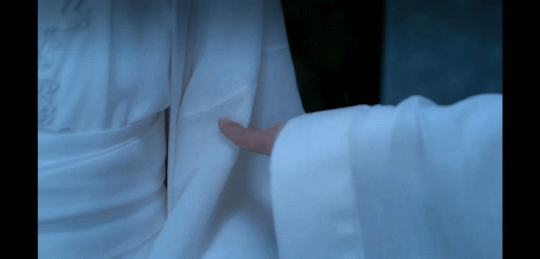
Of course I loved every single moment of the Drunk!Lan Zhan sequence, starting with that tiny little flirtatious gesture by Wei Ying. Seriously, how CUTE is that?? Makes me smile every time I see it, and I’ve rewound that little moment numerous times. How anyone can be resistant to Wei Wuxian’s charms I can never understand, but clearly Lan Zhan was still holding out on him. I’m glad that Team CQL chose this incident to reveal the nature of the Gusu Lan head ribbon since it directly led to Wei Ying’s bonding moment with Lan Zhan. Even though the other man was still generally cold to him, it was really sweet that Wei Ying still felt comfortable enough to share the precious memory of his parents with him.
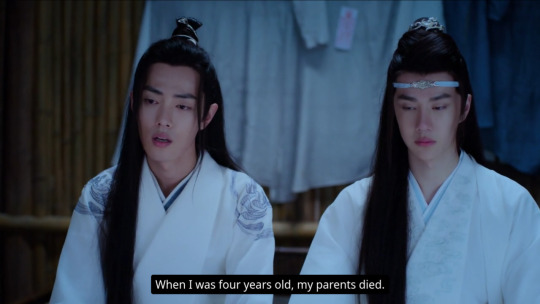
It’s a real shame that Lan Zhan didn’t remember any of it the next day, but I did take comfort in the fact that he still knelt by Wei Ying like a united front to receive Uncle Lan’s wrath and punishment. I’m sure most of that was motivated by his own pride and sense of righteousness, but I still found it touching, especially with how much Wei Ying was defending Lan Zhan so that he would be spared the disciplinary action. Wei Ying was much less protective in the novel during that scene–he was mostly indignant–even though he was still the one to blame for Lan Zhan’s involvement in the whole incident by basically tricking him into breaking curfew. I love that even though Team CQL changed the drinking incident, they still managed to maintain the spirit of its novel counterpart, much like they did with the Phoenix Mountain Hunt.
And then of course there was this:

Which was obviously a treat for our imaginations to get our creative juices flowing so that we can imagine on our own what might have taken place during the night that led to Wei Wuxian waking up in his half-dressed state. For this gift, I am eternally grateful to the production team.
Jiang Cheng Has Fun For Once

I was actually surprised that Jiang Cheng would join in on the drinking party because up until then he had spent most of his time basically disapproving everything Wei Ying did while also seemingly in a constant state of worry that he would embarrass their sect. Imbibing alcohol was clearly a violation of Gusu Lan rules so it’s kind of amazing that Jiang Cheng willingly join in on such an act of rebellion. Nie Huaisang, on other hand, I totally expected to be a part of the shenanigans…I would’ve expected nothing less from him…but Jiang Cheng was a pleasant surprise. I really enjoyed seeing him let loose like that, especially since we got to find out what he looked for in a mate.

The sad thing is Wen Qing actually fit all of his requirements for a wife, except for that family one, which i in the end, proved to be the most important one after all since it became the deal-breaker, dooming their relationship before it even got a chance to get started.

Another rather sad aspect of seeing Jiang Cheng so at ease and acting like a total goofball is that this really would be the only time we would ever see him this way. His time at Cloud Recesses was probably the most enjoyable and carefree for him. I doubt he was ever able to enjoy himself the same way again. It actually makes me wonder if he EVER was able to have fun, period, during the last 16 years. Just thinking about what he’s gone through makes me wish I could give him a great big hug.
Reason #10 for Why I love Big Bro Lan Xichen
His amused reaction to hearing about Wei Ying’s transgression:
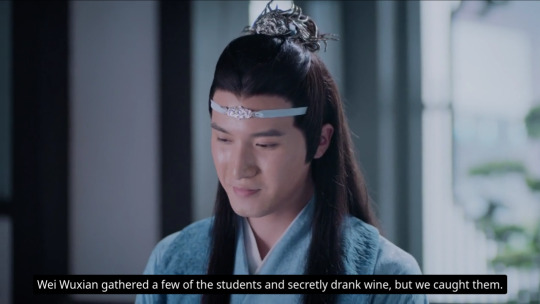
…which was immediately followed by his “oh shit” response to hearing his little bro was also involved.

Big Bro Xichen is just too adorable, AND HE DESERVES ALL THE LOVE IN THE WORLD DAMMIT.
Uncle Lan is One Mean Mofo

Seriously, what’s with Lan Qiren’s obsession with the number 300? I really need to know if there’s some significance to that number since it’s featured in BOTH of the major disciplinary incidents in the show that were carried out by Uncle Lan. For this first outing, those rulers looked downright brutal; it’s a utter miracle that Wei Ying and Lan Zhan were even able to survive being beat 300 times with that medieval torture device. At the very least their spines should’ve been broken, paralyzing them for the rest of their lives. In the novel they were only caned 100 times, which is still a lot but it’s still a somewhat grounded enough number that I could believe they would be able to heal from their injuries. But 300? They should be maimed. I’ve noticed that with chinese dramas though: they tend to be excessive when it comes to inflicting punishment. I actually stopped watching a show once because the main character was being beaten repeatedly in the stomach (Princess Weiyoung) while being held prisoner. That particular character should not have survived that beating…at the very least he would’ve needed his nutrients to be delivered by IV for the rest of his life (even though IVs didn’t exist yet) because there was no way his stomach was ever going to work again after that. I was almost offended by how ignorant the screenwriters were about basic anatomical and biological functions so I decided to just stop watching (well, the fact that I wasn’t that into the show anyway probably contributed to my decision as well) Of course the 300 floggings weren’t enough to discourage me from continuing forward with The Untamed, but it did throw me out of the show for a good moment because I couldn’t get over how ridiculous that number was. Uncle Lan really has a sadistic streak in him
Not to mention, he was also surprisingly tactless. He had just learned about Wei Wuxian’s mom from big bro Xichen and I couldn’t believe that he would just throw that info at the Wei Ying in such a careless way, only to shut him down when the poor guy desperately asked for more details about his mom. Uncle Lan had to know enough about Wei Ying’s background to understand how sensitive he would be in regards to his deceased parents, so I was actually taken aback by how heartless Uncle Lan was being during that scene, so much so that for a while after, I really wasn’t feeling much love towards him. Although, now that I think about it, love is probably a misnomer any way since I doubt I would ever love Uncle Lan nor can I even say I ever actually liked him–he’s too much of a fuddy-duddy for my tastes. It’s more like I just accept his existence, appreciate his importance to the Lan brothers, and I find his disapproval of Wei Ying kind of amusing. But in that moment, I definitely did straight out dislike him for being such a cold SOB, especially towards Wei Wuxian.
To be continued in Part 2…(posted)
#The Untamed#陈情令#spoilers#WangXian#Untamed Rewatch#Mo Dao Zu Shi#CQL#MDZS#魔道祖师#Grandmaster of Demonic Cultivation#Founder of Diabolism#Wei Ying Wei Wuxian#Lan Zhan Lan Wangji#Jiang Cheng#ChengQing#Lan Xichen#Lan Qiren#Nie Huaisang#Jin GuangYao#Qin Su
119 notes
·
View notes
Text
Assorted Thoughts on The Dragon Prince Book Three
Hey guys, TheHappySpaceman here. The Dragon Prince. What more do I need to say about it other than what I’ve already covered in my first two reviews? Well, a lot actually.
I was impressed with the show’s improvement from Book One to Book Two and was super excited for where it was set to go in the future. Since then, I have joined the TDP fanbase and supported the show by making memes, reactions, AMVs, oneshots, and plenty of fanart. However, when info dropped last month about Aaron Ehasz and the workplace environment at Wonderstorm potentially not being so good, I didn’t know what to make of it, and as more and more info came out, I became even more confused. Though the fanbase was becoming incredibly toxic due to the near-constant infighting, I promised myself that I would still stick around for Book Three, seeing how excited I had been for it before the controversy, but I almost wondered if it would be worth it.
So, after so many accusations and hollow words thrown around, and after nine months of anticipation… how does it hold up?

…Oh! Okay, wow, this season was a ton of fun. And yes, it’s exactly as good as I figured it would be after seeing Book Two. Everything I could have hoped for from this series really goes full-force here and it rarely if ever lets off the brakes.
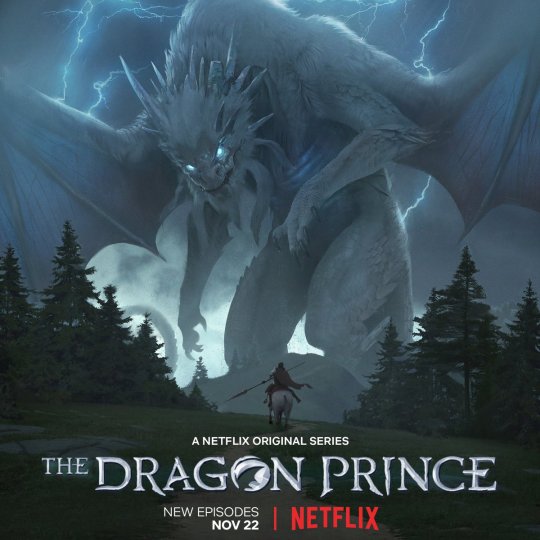
The Story
After a brief intro as exposition, the plot starts immediately after the events of the Book Two finale where Callum and Rayla have entered Xadia and have to face many challenges along the way, including archdragon Sol Regem, Rayla’s hometown, and a rogueish elf thief. All the while, Ezran arrives back to Katolis and has to face the challenges of dealing with being king of a country that he finds in chaos, being pressured to enter war and be the king that Harrow was, while Soren and Claudia are confronted with the decision between helping their own father wage war against Xadia or joining their friends.
The Characters
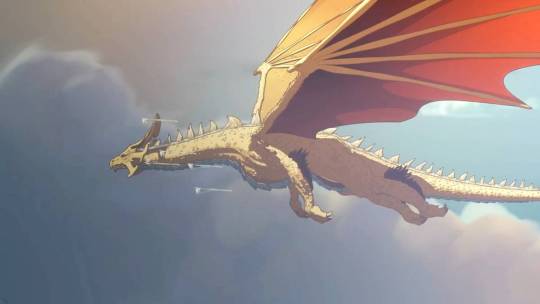
This season introduced a number of interesting new characters. We got to meet some more dragons, for one thing, and while hearing them speak was pretty jarring at first (they talk normal English, which is strange since we’ve never heard them speak before), it turned out to be pretty awesome in establishing the characters. Most notably, we meet Sol Regem, the dragon who appeared in the opening of the series and was on many of the posters, and I’m surprised how he kind of turns out to be a major dick. Since was on so much of the promo materials for the show, I wasn’t figuring this, but he wound up being a racist jackass who was willing to kill our protagonists, including the young dragon prince Zym, all because of his hatred of humans.
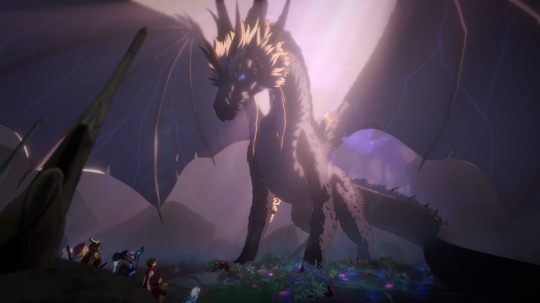
He’s not the only dragon we meet. We also meet Avizandum, otherwise known as Thunder, the late King of the dragons, in flashbacks, and we get to see just how he died. As well, we get Zubeia, Zym’s mom, and Pyrrha, a dragon who Ezran had met in the prior season and befriends. My favorite one might be a nameless dragon who is unchained by Soren and nuzzles him. That’s a really cute scene.
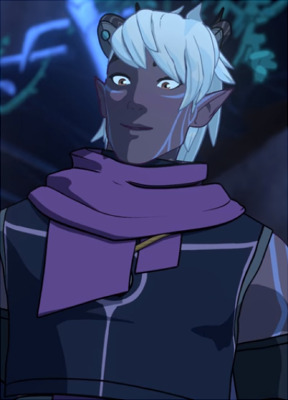
We also meet a lot of new elves this season. Of particular note is Ethari, the Moonshadow elf blacksmith who had been seen in the end credits for Book One and had previously been given the fan name “Tinker.” There was a lot of fan speculation that Ethari was Runaan’s boyfriend and that the two of them raised Rayla together while her parents were gone. Well, this season proves that theory entirely false. No, Ethari is Runaan’s husband. Again, way to go with LGBT+ rep, Wonderstorm (especially since the episode that introduces Ethari was written by a woman in the LGBT+ community)! Ethari’s dynamic with Rayla is also very interesting and shows that he truly does care about her even after her town essentially banished her.
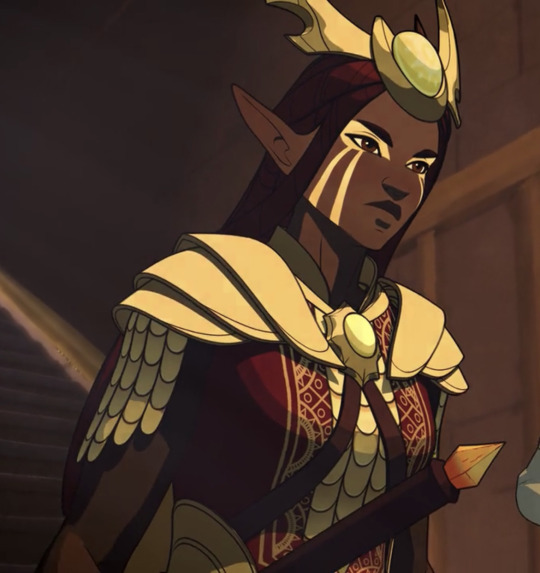
This season officially introduces us to Janai, the Sunfire elf that Amaya was battling in Book Two. I find it interesting how, in many ways, the two characters perfectly mirror each other: Both women are highly dedicated to their duty of their respective countries, and both of them are sisters of royalty, with Janai’s elder sister being the Sunfire Queen. This gives them an interesting dynamic with their interactions. Also of note is Kazi, Amaya’s translator this season who kind of gives off C-3PO vibes. Every scene with them is very funny.

Additionally, this season introduces us to a whole new race of elf: Skywing elves! It only makes sense, since we’ve already met Moonshadow, Sunfire, and Startouch elves; that only leaves two more to go. The two Skywing elves we meet are Ibis, a mage who works directly for the dragon queen Zubeia; and my personal favorite, Nyx, a loveable rogue type of character who our heroes meet when crossing the midnight desert. Man, I love Nyx, and yet, I feel like this season doesn’t do enough with her. I mean, they introduce her in episode four, and then she just kind of disappears after episode six. I was hoping that she’d play a bigger role, especially seeing how hyped up she was in the trailers for this season. Still, maybe she’ll appear again. She played an interesting part as an antagonist and I’d like to see her come back.

Speaking of antagonists, how about this guy? Prince Kasef. Man, the writers wanted to make a real jerk type of character and they succeeded. He’s the warmongering son of King Ahling who takes over after his dad’s injuries from last season. Outside of a cool design, there is nothing redeemable about this character. I’m not faulting the show for this, for the record. It seems like it was the writers’ intention to make him a complete asshole, very comparable to Viren in a lot of ways. Kasef is taken down in a pretty spectacular way, for the record, and it’s hard to say he’ll be missed.
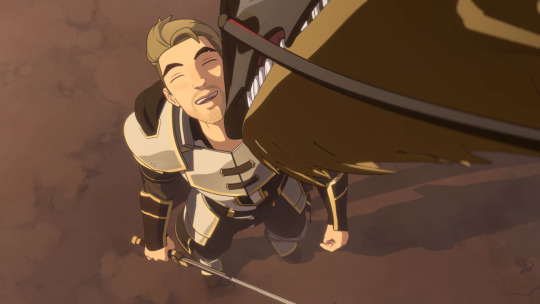
But of all the new characters introduced, to me the real standout character of the season is one of the main leads from all the way back in Book One. Man… Soren is just great this season. After breaking his spine in Book Two, we get to see him go through so much character development beyond just being the dumb comic relief. He starts to question what is right, what side he should be on, and he is put through so much hell in the process, but he comes out better for it in the end. Leave it to the head writer of Avatar: The Last Airbender to make me feel sympathetic for a character like this.
The Animation
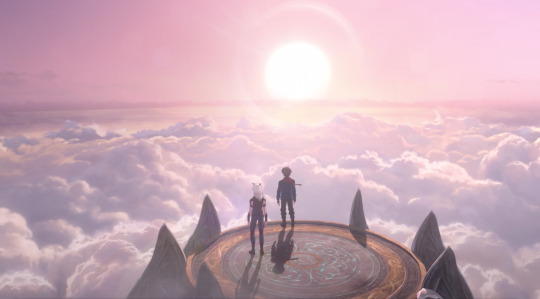
Holy crap, the animation in this season is so damn impressive! Bardel Entertainment already fixed the animation in a major way between Book One and Book Two, but this season gives us some seriously amazing moments that I never would have expected from this show after watching Book One. Everything feels so much more fluid this season, even more improved than Book Two in that respect. The backgrounds are downright stunning, too. They feel so real, like you could actually be there with the characters. One of the major gripes I did have with the first two seasons was the facial animation, and how the mouths kind of looked derpy and unexpressive, perhaps due to the CGI medium the characters were animated in. But here, everyone is so emotive and expressive that you can watch the season without audio and still understand what’s going on. There’s a particular scene with Amaya and Janai that I’ll get into later that perfectly shows this. This isn’t only in the mouths, either; we also see little details like characters’ pupils dilating, or the elves’ ears slumping down or perking up depending on the mood. These were little touches that they didn’t have to include, but the fact that they did makes it so much more of an enjoyable watch, because you notice new little details each time you watch it.
The Relationships
I don’t usually have a separate section in my previous season reviews about this, but this season was heavily based on character relationships as much as individual characters, whether they be relationships between family members, friends, comrades in battle, or romantic partners. Just a warning: This section will get into spoiler territory. If you have not watched the season before reading this, I strongly advise you to stop reading and go do that.
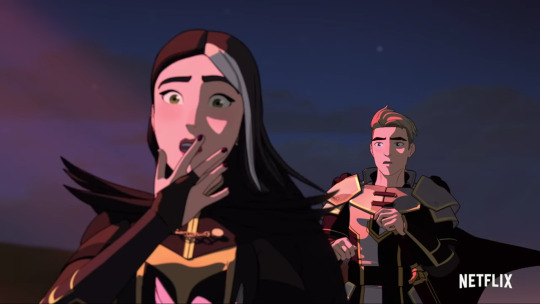
The first relationship I’d like to talk about returns to Soren. During the course of this season, he starts to question the morals of his father, Viren, and Soren has to struggle between his duties to his father and his duties to his country as a member of the crownguard. We get the sense that Claudia has always been Viren’s favorite, and that the abuse and gaslighting Soren has to deal with in this season is nothing new and Viren’s contempt for his son has been building up a long time. Soren’s relationship with Claudia strains in this season until, when not wanting to make his sister choose between him or Viren, Soren cuts ties with her. The scene where he says goodbye and leaves is genuinely a heartbreaking one, and in general, you can feel the emotions all the characters are going through.
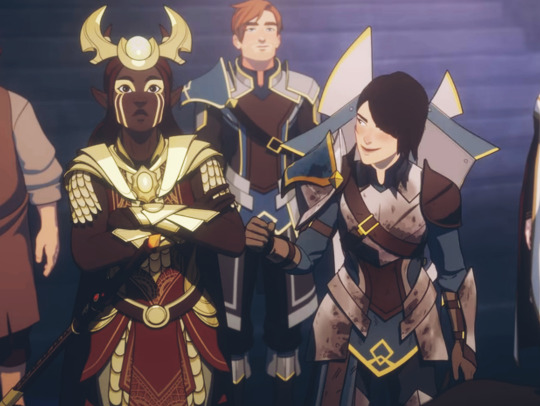
With Amaya and Janai, the two form a mutual respect over the course of the season. Amaya defeats Janai at the breach, but when seeing that the Sunfire general is hanging for her life, she ultimately saves Janai from dying. As the days go on and Amaya becomes a prisoner, Janai defends her against the Sunfire queen and they soon form a friendship that hints that it might lead to something more. But the scene that really increases the characters’ development is when Aaravos straight-up murders the Sunfire Queen. This sends Janai into a rage and she runs in, willing to risk her own life to avenge the death of her sister, but Amaya tackles her to the ground and gives her a solemn look of understanding, of knowing how it feels to lose her own sister. This little exchange is very powerful. I’ve always said that a scene is effective if it manages to give you chills without any dialogue, just letting the music and animation speak on its own, and, well, this scene passes that test. (Major shout-out to Frederik Wiedmann’s score, by the way; it really shines in this entire season.)
And… well, okay, there’s no use dodging it anymore. Let’s talk about these two.
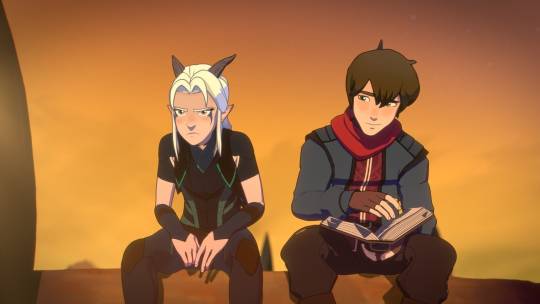
Rayla and Callum. Oh boy. So, remember in my last review how I said it was likely that Rayla and Callum were going to get together by the end of the show? Well, since this show has a planned seven-season run, I was expecting it to happen way later, like in Book Six, or more likely for them to pull the Last Minute Hookup thing where they confess their love and finally kiss at the end of the last season. That trope always frustrates me, but it’s a good way of stretching out the romantic tension for as long as possible to keep fans interested, so I figured that’s what was going to happen, right? Well…
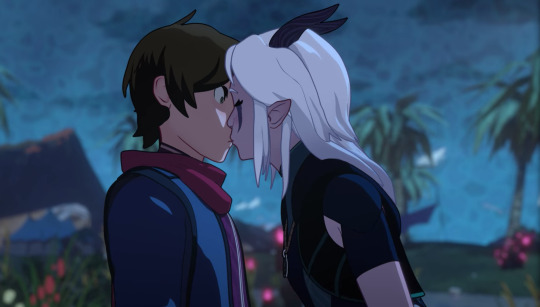

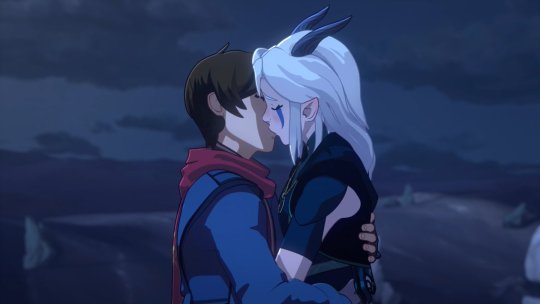
Yeah, I went into this season expecting a slow burn, but instead we got a freaking forest fire. Holy crap, I was not expecting them to hook up this early in the show. And it didn’t happen in the last episode, either; no, they shared their first kiss in episode four, smack in the middle of the season. And you know what? I’m all for that. The writers handled their relationship really well and it felt surprisingly believable and not rushed despite happening so soon. It hasn’t been confirmed how long Callum and Rayla have known each other for, but I’ve calculated that it’s been anywhere between 20-30 days since they first met, which is more than enough time to fall in love. Part of why it works is that the dynamic didn’t really change much. They already had a beautiful friendship, and the only thing that has changed between them is that there’s now more kissing. I wouldn’t have depicted their relationship any other way if I had made it canon. This does open up the question of where they’re going to go with it in future seasons, but as usual, I trust the writers not to screw it up. I may honestly dedicate a whole post to why Rayla and Callum’s relationship works, but we’ll see if I have time for that.
Other Stuff (incl. spoilers)
For the most part, the humor in this season is on point. With the exception of an oddly-placed fart joke in episode two, I found myself laughing at most of the scenes where I was supposed to laugh. Highlights include Soren putting stacking three pieces of bread to make a “bread sandwich,” Callum seeing a boomerang and finding it “oddly familiar” (hi, Sokka), and Nyx taking the dragang (Callum, Rayla, and Zym) past a magical forcefield protecting an oasis, saying, “Anyway, here’s the wonderwall.” I had to do a double take with that because I was laughing so hard. Though I think my personal favorite may be when Ibis laughs at Callum because “humans can’t do magic” and Callum does this.
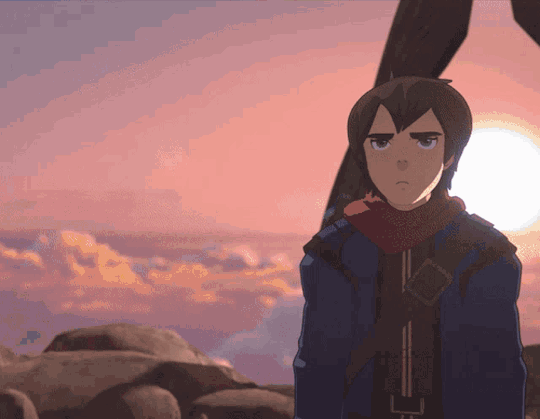
Just, the look on his face. He’s so done and it’s hilarious.
One thing I was surprised by in this season was the sheer amount of violence. This one really does feel like an all-out war. Apparently, the violence was enough to get it rated TV 13 in some countries (though it’s still listed as TV Y-7 here) and honestly, I can see why. There’s an all-out battle scene in the last episode that could be compared to the climax of Return of the King. Everyone is fighting each other; even the Baker from Book One gets a few punches in there! Not only that, but there are a huge number of onscreen deaths in this season. As previously mentioned, we get to see the Sunfire Queen be Thanos’d. Prince Kasef gets a pretty spectacular death when Queen Aanya has a Big Damn Heroes moment and shoots an arrow through his head. Not to mention that we get to see Viren die not once, but twice! Even though Claudia resurrects him using dark magic, it’s still pretty great to see because he’s a turd. (No offense to Jason Simpson, though—love ya.)
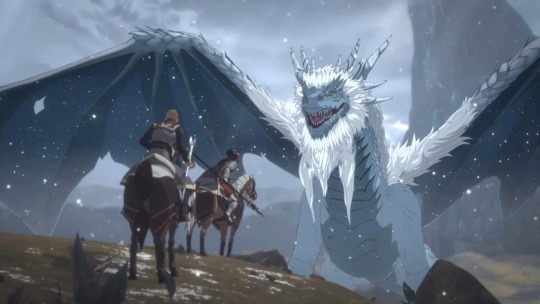
By far the hardest death scene to watch, however, is the death of Avizandum, the Dragon King. In the flashbacks, we get to see how Harrow and Viren killed him, and, well… it’s really painful. The death, by way of petrification, is shown to be slow and agonizing, and Avizandum is shown tearing off his wings in a futile attempt to survive just to make it back to Zubeia. Even Harrow is mortified, with a look of “Oh god, what have I done?” on his face. In his last moments, Avizandum sheds a tear knowing that he will never be able to see his son grow up, and we as the audience are given a grim reminder that everyone… is a person. Even our enemies have families they care about. Avizandum may have been a gigantic, powerful dragon who hated humans, but at the end of the day he was still a dad who wanted to protect his son.
My One Complaint
Okay, so I’ve talked about everything I love about this season, and how it has significantly increased the show’s potential. With all that said, why can’t I give this season my full props? Well… I’ll be honest, it’s because of the pacing. Remember how I said this season rarely if ever lets off the brakes? Yeah, that’s both a blessing and a curse. There are a lot of people online who believe that Rayla and Callum’s relationship was rushed, and I somewhat agree with them, but only to the same end that everything in this season felt rushed. Nine episodes just isn’t enough time for each season. This has been a problem I’ve had with previous seasons, too, but here, it felt especially rushed because so much happened in this season that it felt like we couldn’t dedicate enough time to everything. I’m not saying that every season needs to be twenty episodes long like Avatar—especially since, with four more proposed seasons, we’re already supposed to be getting more episodes than Avatar if all goes according to plan—but 10-13 episodes per season would probably be beneficial for future ones, especially since future arcs of the show are overall going to be shorter (only two seasons each instead of three). Or hell, maybe make the episodes longer. Of course, if that’s my biggest gripe with this season, then we still have it pretty good, let’s be honest.
Where Do We Go from Here?
So, the question remains, where does the show go from here? There are supposed to be four more seasons, but the final episode of Book Three, titled “The Final Battle,” honestly feels like a series finale in a lot of ways: There’s a big epic climax, Rayla and Callum are together, Zym is reunited with his mom, and the elves and humans have formed an alliance, if only temporary. It all seems too easy, doesn’t it? My guess is that this was meant as a pseudo-series finale just in case Netflix doesn’t renew the show for a fourth season.
However, as I’ve rewatched the season, I noticed that they still leave a lot of loose ends. Most notably, Aaravos is seeming to metamorphize and grow outside of his mirror. Judging by how Aaravos really let loose in this series, I can’t wait to see more of him as a villain and find out about his backstory. Also, Rayla was ghosted—or banished—from her hometown after failing her mission in Book One. Will she ever be able to go home again? On a related note, what did happen to her parents? Are we to assume they were trapped in coins like Runaan (and speaking of which, will Runaan ever get out)? There are also other unresolved plot points, like Claudia’s path down the road of dark magic, Viren’s ex-wife, and Callum’s dad. The last one is especially interesting to me, since it would be cool to know if Callum is secretly half-elf, which is why he knows how to do primal magic. Oh, and my question from last season about whether Harrow’s soul is in Pip’s body still remains. So it seems like they left enough open-ended so that they could continue with a new season.
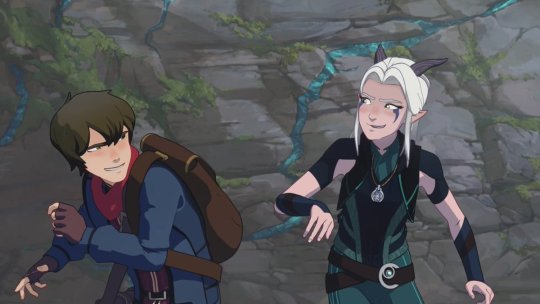
I do hope to see how Rayla and Callum’s relationship develops in the future, though that may just be the shipper in me talking. But in all seriousness, this does open up some potential. As far as we know, Rayla and Callum are the first human/elf couple, so how is that received? Will they be judged by others? Will certain problems arise from this? I hope the upcoming seasons explore this and don’t just pull the usual romance clichés, though the writers have been pretty good at avoiding those so far.
I also have to wonder: When interviewed, the creators of The Dragon Prince said that there would be a time skip between Book Three and Book Four, since each of them is part of a separate story arc. How much of a time skip will it be? I can’t imagine that it will be over a year, but if it is, I hope they don’t do one of those things where since the main cast is too old now, they replace all the main characters with new ones and expect the audience to get invested in them. I highly doubt they will do that, though. It would be too jarring.
Conclusion
If you have been sleeping on The Dragon Prince, I highly urge you to check it out. Book Three is everything I had hoped the first two seasons would be, and more. With fantastic animation, likable characters that go through unique development, and a downright beautiful score (seriously, major props to Frederik Wiedmann), it wonderfully wraps up the first major arc of this series. I hope Netflix renews the show for all seven seasons, because this one has left me wanting more.
~Spaceman
#the dragon prince#assorted thoughts#review#tdp s3#tdp s3 spoilers#tdp#the dragon prince season 3#callum#Rayla#rayllum#tdp ezran#tdp soren#tdp claudia#prince kasef#avizandum#azymondias#tdp zym#zubeia#sol regem#amaya#tdp amaya#tdp janai#tdp nyx#tdp ibis#ethari#Viren#king harrow#aaravos#tdp book 3#i'm late i know
9 notes
·
View notes
Note
I like how you do OCs. So many fanfictions make them overpowered and without flaws. But your ones come off more natural, half of them aren't even martial badasses but just regular people getting by. Like Kino, or Shouji. If I recall, Rui Shi was once some nameless caption before you developed him. Hina is, haha, yeah, a bitch, lol. Is it just me or would Ozai's assassin and Toph make a great comedy duo? The blind girl and the invisible man. Even Xin Long has personality. My fav is still Rui Shi.
Well, like I always say, Shoji isn’t an OC :’D he’s another repurposed one-time canon character who got a much bigger role in Gladiator than in ATLA, just like Song. This is him! It’s possible that it will become more obvious that he’s a canon-based character in chapter 201, but even if it’s not that obvious, now you know the truth!
Either way, I’m glad you like my OCs! Rui Shi is one of the best of them, without a doubt, so I take pride in knowing he’s your favorite. I guess there are many secrets to making OCs for fanfiction, because chances are you will need OCs in a long-term story like my own… but when I started out with the story, I always kept them at a minimum both because I wanted to use as many canon characters as I could (hence, Shoji), and because I knew of the stigma that surounds fanfiction OCs. There’s people who do like reading about OCs… but the majority of the readers will open a fic out of interest in the canon characters they already know and love. If your story isn’t outright about OCs, you risk alienating readers by introducing characters who could feel out of place in the setting (and that, I think, is what bothers you with OCs who are overpowered and flawless).
Admittedly, it may sound like I’m talking out of my ass because of characters like Rhone and Seethus, who probably do fall into the overpowered OC cliches… but uh, small secret: they’re not exactly my creations. They were a suggestion by a friend, one of Gladiator’s staunchest supporters from its very inception (being upfront, Gladiator wouldn’t even exist without him), and I did my best to accommodate them into the story despite there were some things in his original ideas for the characters that would have been quite difficult to work with. Seethus seems to have been received much better than Rhone, which is a relief for me, but the truth is that neither of them are 100% mine and they follow entirely different character-building principles because of that.
Outside of those two, though, the other OCs we have generally obey the need for these characters to exist in this world and setting: when it comes to the soldiers in the Fire Nation army, the show portrayed them as real people by the last season but I wanted to flesh out some of them further than that, beyond showing they can be nice to prisoners (Iroh’s friendly prison guard) or playful with each other (the ones from the Boiling Rock). That’s where Rui Shi came from, the most exasperated and tortured Royal Guard in the history of the position. Part of Rui Shi’s success, I think, comes from him being 100% loyal to Azula despite being 100% exasperated by her antics just as well :’D he’s a cool guy, but all he ever wanted was to protect a Princess who refuses to be protected and who seems to make a sport out of making his job more and more difficult xD which results in his constant clashes with her and his little patience for the ridiculous crap she gets up to more often than not. He serves as a counterweight, I think, to all the characters who are starstruck by Azula and Sokka: he’s a grounding character, helps us see these two are a pair of reckless dorks in love who need to get reeled back into their best behavior once in a while.
And then there’s Kino, who basically breathed life into the South Pole and created much more fun dynamics with those characters than everything that had preceded him. Kino was a REALLY lucky hit, a completely random night-time idea that came to me when I was about to go to bed… and when I woke up the next morning I couldn’t remember him anymore :’D it took a while for me to remember what that damn great idea had been… I was so glad when he returned to me, honestly xD Kino is a lot of fun, and as comedic a character as he may appear, that comedy is what makes him an individual rather than just another soldier. The idea of him being largely ignored by his fellow soldiers and commanding officers started off as a funny way to ensure he could hang out with Katara and Aang without trouble… but in Part 3 that will result in a pretty useful skill that everyone shall cherish him more for. He’s a counterweight to main characters too, in a sense, but in the opposite way Rui Shi is: he lightens up the generally serious and heavy South Pole chapters and embodies the common, ordinary Fire Nation citizen who has been indoctrinated since youth but who can find a new path for himself, learn better, cherish new ways of living once he’s removed from that very toxic environment.
I could talk for ages about the OCs in the story: Xin Long being so feisty, for instance, comes from my need to give him a visible personality, reminiscent of Azula’s own, just like Appa and Momo had in canon. Otherwise he’d feel like a mere object to be ridden back and forth between places and nothing more… which would be really demeaning for a proud creature like that, huh? :’D But I think you’ll get bored of reading too much of my OC theory, because I’ve thought about this stuff a lot xD Still, I’d like to add that there may be some characters who feel a little more complex, who may have more substance to them than initially obvious…
… And it’s because they do have more of it: I had an original story before Gladiator, pretty dense and huge story, and I’ve littered Gladiator with cameos of those OCs EVERYWHERE, it’s just not something anyone can tell because that story was never published (and never will be x’D). So… remember the Priestess of the Flames, from the Dragon’s Pit? She’s one of my favorite characters from that story xD some of her defining traits in Gladiator are outright taken from her original iteration (if you don’t remember her, no worries, you’ll see her again in the upcoming Slave Riot arc and I suspect she’ll make more of an impression there). Your Doom, his sponsor, the Ruthless Hero, the Dark Rook, Scoundrel and his sponsor too… they’re all crossovering OCs who got small roles in Gladiator xD in general, these repurposed characters have always been background or secondary characters (the ranking is FULL of these OCs, even if they might never get speaking roles, because that way I could fill up the ranks a little faster :’D), but that they already have established personalities allowed me to work easily with the ones who do have a starring role in the story, without needing to spend more time than I could afford fleshing them out so they felt believable.
I guess that really should be my final point: the OCs have to feel believable. If it looks like they have a life beyond interacting with the main cast, I don’t need to devote too much time to developing them unless strictly necessary (as was the case with Yang and Haiyan, as a quick example). OCs are, ultimately, characters: they have flaws, they have personality, they have a history just as everyone you walk past in the street does, even if you can’t fathom what it might be. As much as the world absolutely revolves around Azula and Sokka in Gladiator, each ordinary individual’s world doesn’t revolve around them. These two are as good as celebrities to admire, leaders to look up to, obstacles to overcome or nuisances to deal with… but they’re not the center of everything for the average citizen, as things stand. They’re not the only thing on their minds. Each OC has their own struggles, their own pursuits, some more mundane than others, just like every canon character does. It’s easy to think of characters, especially OCs, through a very simplistic “helpers” and “foils” filter… but real people are a lot more complicated than that, and so are they :’)
#anon#gladiator#OCs#not gonna lie I love my OCs#I mean I think most people love their own OCs#but I don't think I say it often enough about my own#and yes the Priestess owns my sorry ass#she's one of the coolest characters I've concocted#sassiest asshole with a heart of gold#writing her has always been my privilege#can't wait for you guys to see her appearances through part 2 (slave riot AND the race!)
6 notes
·
View notes
Text
DIVINE GATE, TELL ME WHAT DID LOKI DO TO YOU TO LOOK LIKE THIS?! (ノಠ益ಠ)ノ彡┻━┻
Before we start, let me say this: “I AM A TRUE MASOCHIST”, so don’t blame for whatever happens from now on for it ain’t worth it. 三⊂( っ⌒◡| Some time ago, week or two to be more precise, I have set myself on an impossible anime challenge. Maybe it’s not as tedious as rolling that goddamn rock up the hill, but still will consume a lot of my time and energy. Ekchem, anyways… I have decided to watch each, and every anime produced since Winter Season 2015/2016 till now and review them all, oh boi! ゞ◎Д◎ヾ
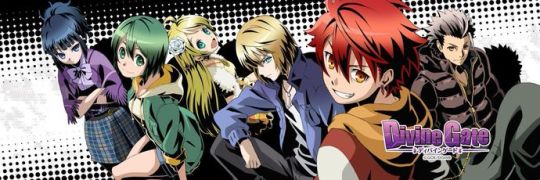
First up for the task is Divine Gate, which I thankfully, bless my stupid ideas, watched at work while no one was paying attention. (̿▀̿ ̿Ĺ̯̿̿▀̿ ̿)̄ The creation of Studio Pierrot, which has some quite big fishes swimming in their garden pond, such as Bleach, Naruto or Tokyo Ghoul as well as one of my all time favourites Greatoooh Teacheruu Onizuka!!!! (┌゚д゚)┌ (┌゚д゚)┌ (┌゚д゚)┌ (┌゚д゚)┌ has decided to make an anime out of a game, and as I have previously discussed while reviewing Caligula it is never easy. Once again, I did not play the game and I’m pretty sure that after watching this anime I don’t feel like playing it even more. (◎ー◎;)
T H E P L O T 【 TV 】 -o(. ̄ )
Hmm… (ʃ⌣́,⌣́ƪ) What is the actual point that this story? I have absolutely no f**king clue. ¯\_(ツ)_/¯ Zero, empty, brain dead, error, you name it. It generally resolves around the idea that there is some miraculous entity or object known as Divine Gate and that only those, at least according to one annoying little twat in XVIII century grade school uniform, who have suffered great despair have right to attain it. The Gate is supposed to give its’ conqueror an immense power and right to shape the reality according to their whim. (p〒д〒q) While, all that sounds sweet and sugar, it’s pretty much bullshitu.
The story, I presume, was supposed to keep the viewers at the edges of their seats watching the main characters struggle with unjust and cruel word, until finally while standing just ONE TINY STEP away from fulfilling their desires, to see the— ┏( ゜)ਊ゜)┛Unfortunately, the delivery was as flat as Krul Tepes’s chest. F**ck, now my eyes are bleeding, halp. ( ´༎ຶㅂ༎ຶ`) Hence, not only the final moral, which is probably something like “no one has right to shape other people’s life for them”, doesn’t land, but also half of the story itself makes no sense in correspondence to it.

Sigh. On top of all that, those who have the right to seek the gate, known as “Adapters” have developed superhuman abilities (supposedly at birth, but it doesn’t look to be the case with Aoto, or I am an idiot ∑(。・Д・。)??? – both could be true) and although they can use them without any device, but at the same time, they need objects called “Drivers” in other to shape them. …..φ(〃∇〃 ))) And when I say they can use their powers without a device, I am pretty much referring to Aoto, because if I understood correctly freaking GODS are USELESS without it. 凸ಠ益ಠ)凸 Can someone please explain what the funk is happening here?! Even Mortal Kombat makes more sense than this show.
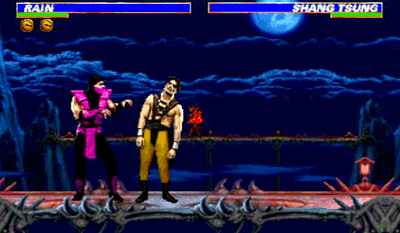
T H E C H A R A C T E R S 【 TV 】 -o(. ̄ )
I am one of those fangirls, that always find their own favourite character in each series, welp guess what? Not today Satan, not today. (ノಠ益ಠ)ノ彡┻━┻ The characters were flat, one dimensional and pretty much boring from tip of their heads to their toes. In Divine Gate we follow three main teenage characters, what were their names again? Σ(‘◉⌓◉’) Well, I only remember Aoto. There was also this “overly moral oblivious kid” and “spoiled female character whose biggest issue was that one friend who left her”, so let’s just skip them! ヽ( ˘ω˘ )ゝ
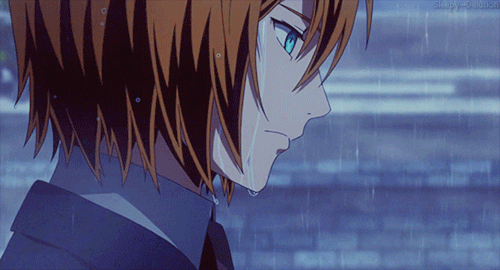
I will admit, however, that I quite enjoyed the toxic relationship and interactions between two brothers, Aoto and hmmm… ( *´罒`* ) His name sounded similar, hmm... (*≧▽≦) Whatever, let’s call him “emo Aoto”! Anyways, the tension between two brothers, with one being overprotective to the point that he’s willing to sacrifice almost everything to protect his ototo without noticing how harmful that is to his secreted little brother and another becoming emo and twisted to the point that he believes death to be their only salvation, is slightly fascinating. Although, both are somewhat extreme in their own characteristics, at least something was finally happening! Щ(・`ω´・Щ)
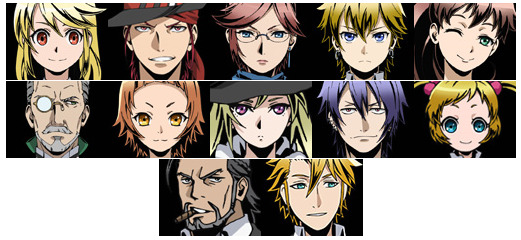
As a desert in this meaningless dinner we have almighty and famous Knights of Round, but round what? Eyeball, planet, ass maybe?! ( ಠωಠ) Let me name them all first before we go, hmmm… I don’t know, nope, neither… ( ゚ー゚) Something is coming to me, but nope, still nothing. The old guy is a butler, right? Who is that chick? Hi there, nameless lady. ( ͡° ͜ʖ ͡°) Wanna have a drink with me? I’m pretty sure he was called... Σ(-᷅_-᷄๑) Still nothing. Is this guy mafia? OH, LANCELOT! ✧٩(ˊωˋ*)و✧ Okay fine, I admit I knew Gawain and Mordred as well, but the point which I was trying to make, was that most of the characters are easy to forget and made no contribution to the series WHAT-SO-EVER. I know, I know, that they were supposed to be a background and reasoning behind Arthur’s choice, but couldn’t it be made more like this:
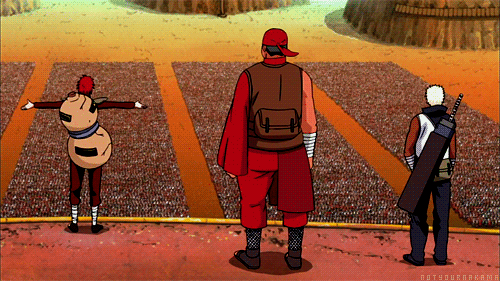
I’m sure their deaths will contribute as much to the story anyways, so just turn them in dots and kill with one Madara blow and secondary characters can still mourn their loss. ¯\(◉‿◉)/¯
T H E R E F E R E N C E S 【 TV 】 -o(. ̄ )
Finally, we have reached my main point of this God-forbit-lengthy essay, which are references to characters of Mythology and literature. We have infamous Knights of Round, (ノಥ益ಥ)ノ ┻━┻ please lemme give you a table to fix this shittu, as well as Nordic Gods with Loki up the front and a Dragon, but what for? ¯\_(⊙︿⊙)_/¯
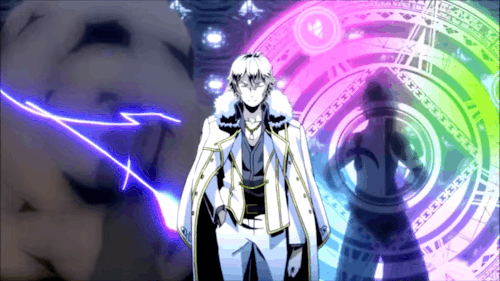
I have nothing against using elements of culture, history or literature in anime, for instance look at Bungou Stray Dogs, that one is priceless, but Divine Gate… Kill me, please.八(^□^*) Leave alone the fact, that Merlin and other Arthurian Legends related movies are my blessed childhood memories and I am big fan of latest creation of this sort, namely Legend of the Sword, but FFS STOP FORGETTING THE GODDAMN TABLE, WITHOUT IT MAKES NO SENSE! IT COULD BE KINGTHS OF ROUND BOOBS, FOR ALL THAT I CARE!! ( • )( • )ԅ(‾⌣‾ԅ) AND I’M LINGUIST, DAMNIT, THIS MISTAKE HURTS ME ON A SPIRITUAL LEVEL!! (╬゚◥益◤゚) [deep breathing] But did you also have to make “that” out of my beautiful Loki?!!
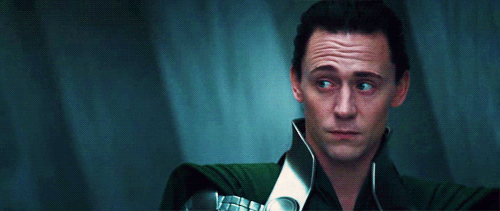
S C O R E S 【 TV 】 -o(. ̄ )
ART: ★ ★ ★ ★ ☆ ☆ ☆ ☆ ☆ ☆
PLOT: ★ ★ ☆ ☆ ☆ ☆ ☆ ☆ ☆ ☆
CHARACTERS: ★ ★ ☆ ☆ ☆ ☆ ☆ ☆ ☆ ☆
SOUNDTRACKT: ★ ★ ★ ☆ ☆ ☆ ☆ ☆ ☆ ☆
GENRE REALISATION: ★ ★ ★ ★ ☆ ☆ ☆ ☆ ☆ ☆
TOTAL POINTS: ★ ★ ★ ☆ ☆ ☆ ☆ ☆ ☆ ☆
F I N A L T H O U G H T S 【 TV 】 -o(. ̄ )
Pardon, my loss of temper in previous paragraph. Thankfully, I am all calm and collected now. However, I must say that watching this anime at work was the greatest idea I have ever had. Why, you might wonder. Because otherwise I would have regretted wasting my free time on this piece of shi—. (;゙°´ω°´) To sum it all up, the references were used poorly and painfully, plot made little sense and the characters were either flat or completely useless, hence came my score of only 3/10 stars. How low you have fallen Loki, how low… 。・゚ヾ(✦థ ェ థ)ノ。゚・。

Thanks for reading! m(。≧ _ ≦。)m
#divine gate#chess#review#anime review#second review#anime#game#loki#arthur#knights of round#references#spoilers#kinda
3 notes
·
View notes
Text
Final Fantasy VIII Translarison, Part 12: Going with a bang
Oh boy, a real week-end! I forgot those exist! Let’s compare some localisations, shall we? I actually took the screenshots like a week ago, and finally I get to talk about them. Geez.
ANYWAY! Things are exciting! Selphie’s team has to stop missiles and try and destroy their base!

First difference, when Selphie explains her “plan”, in the English version, she says “If there’s a door, we go in! If there’s anything we can break, we break!”. The French take on it has a very different tone. She says “My plan: go everywhere and... destroy anything we can.”
Speaking of that, while English Irvine replies to that with “Hey, Selphie. I like your attitude. Let’s do it up!”, French Irvine simply says “Good idea, Selphie!”? Yeah, in this case, I feel like the more subtle style of the French version doesn’t work as well. He needs that extra punch that the English one has.

And speaking of the French version keeping it simpler, here, in the English version, Selphie tells the rest of the group “It might look suspicious if we’re uptight, so let’s just act casual!”, but in the French one, she just says “Let’s play it cool, OK?” and this time, I think I like the shorter version a little better.

Now here’s a very interesting one and I think my favourite type of difference, as it’s another one of those where the concept is the same, but the actual line is completely different. In the English version, the guard tells the group not to run inside the base because the catwalks are very narrow but in the French version, he congratulates the group for walking in a line, and then adds that the Galbadian army is the best in the world.
So yeah, they don’t say the same thing at all, yet both mention proper behaviour inside the base. Once again, it makes me wonder what the other versions of the game say. Also, kudos to the French version for tying it together with the actual gameplay.
The one kinda weird thing with it though is that if the uniforms are any indication, they’re all supposed to have the same rank, so it seems odd that he’d feel the need to congratulate other soldiers. Maybe the idea is that they have different insignias that they didn’t show on the models, much like Squall’s sheath for his gunblade and I am way overthinking all of this, aren’t I?

I’m including this line English to point out that the French version doesn’t have that quy’s speech patterns, which is a bit of a shame as I like stuff like this, that gives a bit more life and personality to an otherwise unremarkable nameless NPC. And they didn’t even ruin it with a stupid catchphrase or anything!
On the plus side, I do like him calling Selphie “kid” in the French version, which is a running thing, presumably with them thinking she’s a teenage boy on account of her height and presumably high-pitched voice.

Here’s one for the “tonal shift” category. In the English version, when you tell this guard that the other two said to go ahead with inspecting the circuit room without them, he just goes “Oh, okay, But I’m still not done here, you know...”. His French counterpart is a lot angrier about it though, going “Argh, that’s such a pain! I’m not done with my work!”.
Similarly, the English one then politely asks Selphie to tell them he can’t do it, only for the French one to order “Just tell them I don’t have the time, OK?”. Man, it’s like the two versions decided to switch and the French one decided to be the less subtle one.

Here’s a funny one. When Selphie is BANGing it a little, in the English version, she says “Destroy everything!”, but in the French, version she says, and I kid you not, “Planetary destruction!”. Oh, French Selphie, and your weird exclamations. You have some serious issues.
There’s also a weird bit after they succeed in temporarily turning off the generator. After Quistis suggests they hightail out of it to avoid raising suspicion, English Selphie says “Alright! NEXT!” but French Selphie says “And then what?”. I get the feeling the translator got a bit confused here as the English interpretation seems to make more sense in context.

Next is another bit that amuses me. As the group takes out two guards that come up, one of them yells out something fairly expectable: “Ughhh... Damn it...” presumably as he passes out. In the French version though, that guy says “quelle misère!” which doesn’t really translate all that well, but think of him basically saying something like “What a sorry situation!”.
It’s just so weird that the French version is a lot more realistic and down-to-earth 90% of the time but every once in a while it does something weird like that. But far more importantly..;

What the Hell?! They BOTH have ellipses?! I”m pretty sure that’s literally the first time the English version has had ellipses like that and the French version didn’t have some sort of line in its place. I am in shock.

And we have another instance of the French translator apparently getting confused. In the English text, this guy mentions he doesn’t remember seeing the crew around here before. In the French version though, he asks “Haven’t I seen you around, before?” which doesn’t make a whole lot of sense. Why would he be surprised to see the same soldiers around the same base?

In case you were wondering, the stuff that’s part of the background on the control panel screen is in English in the French version as well, although text boxes that appear on top of it are translated. I’m actually a little bit surprised that they didn’t translate the backdrop since they’ve done so with other background elements.

Back to Selphie being mistaken for a very young male recruit, this soldier thinks “Did we have someone that puny in our base...?” in the English version whereas he thinks “They really hire kids in this army, now!” here.
Thinking about it, this makes me realize that the Galbadian army apparently doesn’t enlist women as it only has male soldiers. Weird. Especially considering we do see plenty of female cadets in Galbadia Garden.

The speech the base commander gives when he realizes the group aren’t really Galbadian soldiers isn’t very different, except for one interesting detail. Instead of just calling them “intruders” like in the English version, in the French one, he calls them “terrorists”, which is very reminiscent of Seifer being called one too.
And, well, it makes for them to consider people who attacked their leader as terrorists, and is another example of the French localisation making the story feel more grounded in reality, in my opinion. Well, for the most part.
By the way, does anybody know what’s going on with the flash of light the group creates while taking off the uniforms? I don’t remember any of them being able to use Solar Flare and as far as I recall, it’s the only time they do something like that.

But now, we must get to one of the saddest moments in the game, as the characters resign themselves to death. Let us go through they say in French, in order:
Selphie: “(Are we locked in? Squall will handle the rest. But, will he remember to organized the school party? I doubt it... Such a shame. A total failure!)”
Quistis: “It’s a rather quiet end, after all.”
Irvine: “Squall always hated me. That’s why I’m here now!”
Selphie: “(What are you guys talking about! Squall chose use because he trusted us! I’m sure of it. You trust us. Don’t you, Squall?)”
Man, why is it this scene somehow keeps getting me more choked up every time I view it? One thing I’ll say I think is a shame is that Quistis’ line in French is so much shorter as in English, she adds that she thought it would be a bit more dramatic.
Also, you may notice that French Irvine sounds a lot angrier at Squall than his English counterpart, where he says Squall didn’t trust him, and that it’s probably why he put him on the missile team. It sounds more like he’s thinking “No, I get it. I’m the outsider, he wants to protect his friends”.

On a lighter note, we go back to Squall’s team, and I somehow never realized it but Zell totally spoils the twist by saying “Awesome! The vessel is safe!”. Now to be fair, the word “vaisseau” can also refer to a large, arching building or room, which does describe the BGU fairly well, so it may just be the translator being cheeky, but it’s really not a common use of the word and certainly not one the average teenage FF8 player would be aware of.
So it seems far more likely that the translator was given some notes about the BGU but wasn’t informed of when it’s revealed that it’s a ship, or maybe they were tasked with translating a later part first, then went back to this one, leading to the confusion, especially since the building is never referred to as a “vaisseau” up to that point.

Inside, Raijin gives the team the haps on what’s going on and we have another interesting difference. In the English dialogue, he says that it’s “disappointing for the disciplinary committee. All our work for nothin’, ya know!?”, but in the French one, he instead says “The disciplinary committee is rotten. I am ashamed of being part of it.”
Now, while if I had to hazard a guess, I’d say the English version is probably more accurate to what was being said originally, especially since we are never shown any other members of said committee (though it doesn’t mean there aren’t), I do like the idea of said committee joining up with NORG’s forces, supporting their revolt and helping them force cadets to betray their friends.
It seems to have just a little bit more weight behind it than Raijin going “Aw man, the worst part of this civil war is how it ruins our hard work bullying people and abusing our power”. It also gives a more explicit reason for the cadets to obey than just being told to (not that following orders is that weird in a military school, but you see what I mean, right?).
And now that I finally get the opportunity to save my game, we’ll end it here. Hope y’all enjoyed it. As ever, please reblog if you like what you’re reading here in order to help spread the word, and don’t hesitate to leave a comment or an Ask. Those are always strongly appreciated. Also, expect more delays for the next part. Hopefully my schedule should be back on track after next week but it’s a bit chaotic for the time being.
Anyway, see ya, everyone! Have a nice day!
#Final fantasy#Final fantasy viii#Final fantasy 8#FF8#FFVIII#translarison#Translation#Comparison#English#French#localisation#localization#version#change#differences#Selphie#Tilmitt#Missile#Explosion#kaboom#Quistis#Trepe#Irvine#Kinneas
15 notes
·
View notes
Text
ST: The Next Generation S3 Watchthrough Episodes 18-21
Allegiance: So we have Picard whisked away while minding his own business and ends up somewhere with three other people while a copy of him is hanging out on the Enterprise. Don’t you just hate when that happens? It was alright. The concept is an interesting one, a race of hive0mind aliens kidnap people to see how they interact in a bubble while they leave a fake on the Enterprise to see if the crew will keep following Picard. Naturally the crew turns on the fake when he gets out of hand and Riker taking a stand was freakin’ badass, so glad that no one’s a mindless officer who will follow blindly. While the aliens don’t hurt anyone, they DID still kidnap and endanger a lot of people, so Picard telling them offat the end is justified. The whole episode hinges on Patrick Stewart’s acting ability as both the real and fake Picard, and to the shock of no one, he knocks it out of the park. They could make him act as a tree and he’d somehow make it into a worthwhile performance. Picard’s certainly not my favorite character, while S3 has had him grow on me the rest of the cast are more appealing to me and as far as overall captians go, TOS Kirk just had a better balance of serious and laid-back for me… he’s topping AOS Kirk though. Also… I know it was witht he fake Picard, but why are we starting the Picard/Crusher ship tease again? They had dropped it since Crusher came back and Picard seems even more married to his job than Kirk was, so… why are we doing this? But ah well. Still, it’s a strong episode for Picard as he shows his natural leadership and Patrick Stewart is having fun as the fake especially when we get to the song number XD It’s a nice episode about authority and when to follow (regular Picard is a reasonable leader who knows how to deal with various individuals to get the job done with the least amount of damage possible) and when to not (when the authority is outright leading you and others to certain death with no regard for those lives). In other words, don’t live in a hive mind. and don’t imprison people no matter if you intend no harm 3/5.
Captain’s Holiday: And speaking of Picard! I guess a requirement for Starfleet Captian is ‘be an utter workaholic who cannot and will not understand the concept of taking a Shore Leave’ and that hasn’t changed since Kirk’s time. Hell, Crusher pulls the same trick Spock did to get Kirk to take one… albeit Picard picks up on it much quicker than Kirk did and he doens’t end up on a planet that causes illusions that involve an annoying classmate, an old crush, and believing that his CMO/best friend got killed via a knight lance… boy Shore Leave was a trip, huh? I love how the entire ship was in on the scheme to get Picard to take the vacation, Riker’s smugness over it is freakin’ amazing. So Picard goes to Risa… and ends up tangled in utter insanity involving a weapon hidden on the planet, the Ferengi, two beings from the future, and a pretty woman adventurer. Guess the other Starfleet Captin requirement is ‘be prepared for your vacation to be derailed even when it doens’t involve Starfleet business because you’re just cursed now, sorry!’ This was fun! I like seeing Picard get to break from his stuffy Captain persona and get to go full-on adventurer and clearly having the time of his life doing so, it fits him really well~! Vash was also really fun and why we haven’t gotten an ST spinoff that would essentially be Indiana Jones in Space after this I’ll never know. It’s kinda nice to just have an episode like this with no complex morality or political/social themes, it’s just a fun adventure to let Picard let loose and the setting is a nice change of pace from the Enterprise. 3/5.
Tin Man: Tam’s inability to stop hearing most everyone’s thoughts which leaves him unhinged gives me major Mao from Code Geass vibes… well, except less sociopathic/stalkerish. I mean imagine being born a telepath/empath with all those senses turned on and being unable to shut them off and thus are overwhelmed by everyone’s thoughts/emotions all around you… yeah I think that the man has every reason to be out of it. I almost wanna say this kinda feels like an allegory for mental illness/schizophrenia, but given that this was in the 90’s when we weren’t that great at understanding that and my own lack of knowledge on those topics, I’m reluctant to say that with certainty. So we have him an an intelligent ship (the tititular Tin Man) drven to despair due to it’s fallen crew and in the end they essentially merge into one being… yeah it’s as wild as it sounds. Oh and they have to deal with Romulans… again. Also not quite sure what happened at the end, but hey it’s an ending. So it was fine. Not really anything else to say on this one. 3/5.
Hollow Pursuits: So we meet Lieutenant Barclay, a nervous, timid man who is constantly late, frustrates his superiors due to his demeanor/insufficiency, isn’t really fitting in, and he vents it out via living out his fantasies on the Holodeck. It’s… oddly relatable. Now mind you I’d probably be as squicked out as Troi was if someone had a hologram of me acting all intimate with them, but hey it’s not like he’s forcing it on the actual Troi. Riker comes off as an asshole though… though him, Troi, and Geordi seeing themselves in the holodeck was funny XD. It’s understandable why Geordi and the others are frustrated with him.. but like Data points out, name-calling behind his back is pretty mean and maybe if they tried to be more understanding and reached out, maybe it would help Barclay. As someone with major social anxiety and poor social skills in general, I could relate to how Barclay felt and it was nice to see an episode focusing on what would otherwise be a nameless nobody in the background. There are more people on the ship than the main group, several of whom they’re the superiors over, so it’s nice to also see Geordi struggling as a superior to a subordinate that he’s having issues with. When Guinan pointed out that maybe Barclay’s late and nervous because everyone acts like they don’t want to be around him or talk to him… damn, that articulates exactly what I felt. Also, you’d think that the Holodeck would… you know, make it so one can’t walk in on someone’s privacy unless it’s an emergency. Just saying. But yeah for an episode in the ’90s, while it doens’t specifically bring up social anxiety or mental illness that one could associate with Barclay and the Holodeck sequences might be more… concerning in a modern light, it does have the message on treating those feeling withdrawn, nervous, and struggling with those kinds of things respectfully and to reach out to them with understanding and openness, not to dismiss or demean them. It’s a lesson I wish that was more clear in the ’90s, it might have helped me with my problems… ah well! 3.5/5.
Alright, we’ve got five episodes of the season left. So here’s how we’re going to go from here. Tomorrow will be 22-25, which I read the title for one and it’s gotten me super excited~! Then we have the finale… which is one part of a two-parter with Part 2 being the beginning of S4. I’ve been thinking of how to deal with this in the watchthrough since I consider parter episodes essentialy the same episode but divided up. What I decided is that on the wtchthrough post I’ll review both parts in one post, give the rating for both as seperate episodes, and then give a rating for them together. When I do the Top 5 Favorite/Least Favorite Episodes of S3 post, it will be counted as one episode if it makes the list and this will be the same for all the other two-part episodes at least for now. After I do the S3 finale/S4 premiere I’m gonna take a break until Monday, and then I hope to go through S4-7 without any stops. So here’s hoping that all goes according to plan.
0 notes
Text
OUAT Episode Analysis- The Eighth Witch
Well, this episode was quite the ride. Buckle up, folks, because we’ve got a wild one here.
We begin with the Parallel Enchanted Forest flashback, where we see Henry introducing the newborn Lucy to Regina, Wish Killian, Tiana and Jack, who is later revealed to be the Parallel E.F.’s version of Jack of Beanstalk fame. Which was interesting, considering the Jack of Enchanted Forest Prime was a woman. Let’s hope the gender wasn’t the only difference between this version of Jack and Jacqueline, and that the giants that this version of Jack dealt with really were the bad guys, and not the real victims. (Rest in peace, Anton’s Brothers.)
On a side note, it was rather jarring that they started off this episode with Lucy’s birth. The last time we saw Henry and Parallel Ella in Pre-Curse Parallel E.F., they had only just kissed for the first time. But now we’re suddenly fast forwarding to them becoming parents. I just found that rather funny. Like, is Henry that good of a kisser that his kisses result in instant pregnancy? I hope not, because otherwise I’d feel really bad for Violet.
Joking aside, I do find it slightly upsetting that the rest of Henry’s family wasn’t invited to the party. What about Snow, Charming, Emma and Killian Prime? Did they not get notified that Henry’s first child was being born? I realize the real life reason why they’re not there, but I still want to know the in-show reason for their absence.
However, Henry notices that Regina also isn’t present, but before they can really figure out what happened to her, Drizella suddenly appears, announcing her intention to cast the Dark Curse on Lucy’s eight birthday. I do find it a bit strange that Drizella was going to wait that long before casting the curse, but I do have a theory that I’ll touch upon later. Though I also found it surprising that this most likely means Lucy is actually eight in the Hyperion Heights scenes. While I realize they’ve never specifically stated her age, I’d always figured she was ten. I suppose it’s possible that the curse has simply lasted for two years, but even so.
Returning to the episode, Drizella’s threat is interrupted when it’s revealed she’s unknowingly triggered a bit of Blood Magic. Apparently, Parallel Stepmother is actually helping Henry and company now, as she’s teamed up with them to stop Drizella from casting the Dark Curse. I guess the fact that neither party wants to see Drizella cast the curse led to Parallel Stepmother burying the hatchet with the New Nevengers. In any event, Parallel Stepmother’s surprise assistance results in Drizella getting turned into a stone statue, which obviously would prevent her from following through with her plans. Because she can’t cast the Dark Curse if she’s encased in stone.
But then, we fast forward AGAIN to Lucy’s eight birthday party. Where we see Tiana is now a queen. Obviously, a lot has happened during the eight years they didn’t bother to show us. Tiana has apparently succeeded in her mission to overthrow the corrupted monarchy and has become the new ruler of the kingdom. And even though the members of her team of Freedom Fighters no longer need to band together, they’ve all remained friends, and have come together to celebrate Lucy’s birthday.
Anyway, Lucy’s birthday party is suddenly interrupted when Gothel appears out of nowhere, effectively gate crashing the festivities. She’s accompanied by a bunch of mysterious guys, all dressed in dark robes. Upon arriving, Gothel reverses the spell that had turned Drizella into a stone statue. The moment Drizella is returned to her flesh and blood state, she, Gothel and the robed figures all teleport off again.
Now, you’re probably wondering who these robed allies of Gothel are. Throughout the episode, we learn that Gothel and the robed figures are part of some secret sect called the Coven of Eight, which I gather is a feared group of powerful Dark Witches. Where did they come from? I have no clue, considering this is, to my knowledge, the first time we’ve heard of them. But it appears that Drizella joined the Coven of Eight in order to cast the Dark Curse. Which kinda makes sense. If memory serves, we saw Regina’s first attempt at casting the Dark Curse back in episode 2 was assisted by a group of nameless background characters, including a blind hag and a gnome. Apparently, Drizella also needs assistance of other people to cast her version of the Dark Curse.
This brings me to my theory about why they apparently had to wait for Lucy to turn eight before casting the Dark Curse. Maybe the number eight is a magical number in this realm. Kinda like how people in this world associate the number seven with good luck. I admittedly know very little about arithmancy, but my quick research on the subject states the number eight is the number of success. Maybe that has something to do with why they decided to wait eight years before making their move. And maybe it’s no coincidence that the number of years they had to wait is identical to the number of witches that are supposed to be in this coven.
Regardless, the fact that Drizella is now at large again, and fully capable of following through with her threat to cast the Dark Curse, puts the New Nevengers on high alert. They begin to take steps to prepare for a way to combat the revived threat to their peaceful lives.
Wish Killian heads off to meet up with Rumpelstiltskin. Who has, for some reason, gotten that weird skin condition of his back. But they’re not telling us why he’s back to being a walking disco ball. Maybe they’ll tell that story in 7B. Anyway, Wish Killian asks Rumpelstiltskin if there’s a way to stop the curse, but Rumpy Rumps insists there’s no way to stop it. However, he does present Wish Killian with a carved elephant. Possibly a reference to the whole saying about how an elephant never forgets. According to Rumpelstiltskin, while this elephant totem won’t keep him from losing his memories, it will enable him and Alice to recognize each other as father and daughter. Wish Killian is both skeptical and a bit taken aback that Rumpelstiltskin seems interested in helping him, which makes sense. Even though this is Wish Killian and Rumpelstiltskin Prime, it seems they can’t completely forget the feud that existed between them in both realities. (Guess this means Rumpelstiltskin knows fully well that Detective Rogers isn’t Killian Prime, after all.) But it turns out that Rumpelstiltskin is actually doing this as a favor for Alice, who has been in Rumpelstiltskin’s company for quite some time now. According to Alice, she feels she owes it to Rumpelstiltskin, because, as she puts it, he gave up a lot for her. Is this related to how Rumpelstiltskin went all ‘crockey’ again? Once again, that’s something they’ve yet to fully explain.
The conversation between Wish Killain and Alice is really lovely, though. Especially since it’s clear that the Curse of the Poisoned Heart is still in effect, and preventing them from getting too close to each other. Plus, Alice might still feel guilty for unintentionally inflicting harm onto her father after Drizella gave her the bogus cure. After all, Killian Prime was notorious for feeling intense guilt over things that weren’t even necessarily his fault. It’s possible Wish Killian possessed a similar trait and passed it down to his daughter. I do wonder, though, if this is the first time they’ve seen each other since that day. I get the impression that they saw each other again at least once between then and now, but it probably wasn’t that often. Before Wish Killian leaves to rejoin the others, their conversation shifts to someone else. Alice begins to refer to someone else she dearly cares about, and she gives Wish Killian what appears to be a love letter, instructing him to deliver it to ‘her.’ Wish Killian promises that he will do so. Before parting, Alice tells Wish Killian that she would have written a letter for him, but she knows he already knows how she feels about him.
Meanwhile, Regina heads off to some small farmhouse in the middle of the woods. As she approaches the house, a few arrows fly by, narrowly missing her by inches. Upon turning, she sees the archer is a young woman who is quickly identified as Baby Robyn, Robin Hood’s daughter, now fully grown. Somehow, Zelena and Robyn have also wound up living in Parallel Enchanted Forest. Once again, there’s no explanation as to why they left Storybooke. Or why Robyn is a young adult now.
To properly explain why this is so weird, I have to discuss a plot point that’s revealed near the end of the episode. The love letter Alice wanted Wish Killian to deliver turns out to be meant for Robyn. Because Alice and Robyn are in love. Again, we currently have no explanation to how they met. But I don’t have any issues with this particular pairing. And it’s rather cool that the daughter of Robin Hood and an alternate version of Killian Jones fell in love. I’d always wanted to see more interaction between Robin and Killian, and I can’t help but wonder how they’d react to knowing Robin’s daughter ended up with Wish Killian’s daughter. The thing that makes me scratch my head is that Alice was conceived around the time when the timelines for Enchanted Forest Prime and Wish World diverged. Which means Alice should be around Emma’s age. And Emma was probably thirty when Robyn was born. Which means Alice should be roughly thirty years older than Robyn, too. But in this episode, Alice and Robyn appear to be around the same age. To the episode’s credit, it does kinda acknowledge the whole aging issue, with Regina commenting on how Robyn grew up so quickly. But Zelena just gives a hand wave explanation, stating that time didn’t pass by so quickly in their realm. Which I guess is the show trying to say that time simply passes differently from one realm to the next. (Though that doesn’t exactly explain why Henry and the others don’t appear to have aged a day, even though eight years have apparently gone by in Parallel Enchanted Forest.) But random aging processes are just a common thing in this show.
Anyway, Regina and Zelena discuss the problem about Drizella, and the involvement of the Coven of Eight. Turns out they’ve been trying to recruit Zelena, as their calling card coin had been left out on her porch. This is something that might be confusing, as Zelena was supposed to have lost her magic at the end of S6. But according to @fandom-oracle, it’s possible she managed to regain her magic after the Black Fairy was defeated, and that there was even a scene from the S6 finale that showed her using her magic to play with Baby Robyn, which ultimately ended up on the cutting room floor. So I guess that’s as good an explanation as we can get. So Regina suggests she and Zelena once again team up to try and combat the Coven of Eight together, in the hopes that doing so can prevent them from succeeding in casting the Dark Curse.
While all this is going on, Henry and Parallel Ella have been working on the question of how they’re going to protect their daughter from Drizella and her allies if Regina and Zelena can’t find a way to stop them. Eventually, Henry comes to a decision that Parallel Ella has misgivings about, but she knows that it’s their best shot at keeping Lucy safe. This plan brings us full circle with the scenes we got in the S6 finale. Henry takes Lucy deep into the woods, where they find the Parallel E.F.’s equivalent of the magical tree that was used to create the magical wardrobe that sent Pinocchio and Baby Emma away before the original Dark Curse was cast. Henry’s plan is to use the magic tree to get him and Lucy to safety, so they’d be able to work together to break the curse once it’s cast. While Henry works on fashioning the new magic wardrobe, he entrusts Lucy to the care of Tiger Lily, who has finally made her appearance. I like to think her appearance is the show’s way of showing that Henry maintained contact with everyone back in Storybrooke, and maybe even visited them on occasion. (To be honest, it would make him look like a huge jerk if it was any other way. Imagine never returning home to visit your family, even after eight years have passed.)
Unfortunately, Henry’s task of building the wardrobe is interrupted when the Coven of Eight attacks. As we saw in the S6 finale, Henry quickly makes his way back to Lucy, instructing her to get the Storybook to her mother and then stays behind to try and buy Lucy time to escape. After Henry is captured, Tiger Lily escorts Lucy back to Tiana’s castle, where they inform everyone of Henry’s abduction. While everyone’s first instinct is to organize a rescue mission, Parallel Ella ultimately decides that that’s what the Coven of Eight want, and that doing so will distract them from their main objective in stopping the Dark Curse from being cast. They also know that Henry would not want them to risk everyone’s safety for his sake. So the New Nevengers set out to the place where Drizella, Gothel and the rest of the Coven of Eights are to cast the Dark Curse. And once they arrive, it looks like they’ve succeeded in stopping the ritual, with Parallel Ella, Regina, Wish Killain and Parallel Stepmother subduing the witches. That is, until Drizella reveals the ace up her sleeve. It turns out one of the cloaked figures standing among the Coven of Eight is actually Henry, who has been bound and gagged. And once his identity is unveiled, it’s also revealed the Coven of Eight had poisoned him in such a way that Regina’s magic cannot cure him. Drizella proceeds to tell Regina that this was the full extent of her plan. In this version of the Dark Curse, you don’t need to actively crush someone’s heart. All you need is the magic of someone who already crushed the heart of the thing they loved most. Which means that Regina, who had crushed her father’s heart to cast the original Dark Curse, can cast the curse anytime she wants. As such, Drizella tells Regina that she has a choice to make. She can either cast the Dark Curse now so Henry and everyone else will be transported into the Land Without Magic, where the effects of the poison inside Henry will be nullified, or she can do nothing and let Henry die.
So now we know what the Big Horrible Thing that’ll happen if the curse breaks will be. Because the moment the curse breaks and everyone wakes up, the poison inside Henry will also reactivate. No wonder Regina is feeling conflicted over breaking the curse in Hyperion Heights. She knows that doing so would mean sacrificing Henry. On the one hand, I do wonder if Regina contacted Emma in Storybrooke after Drizella woke her up a few episodes back. After all, Henry is Emma’s son, too. So she has a right to know that her son’s life is on the line. On the other, I suppose it’s possible Regina knows that Emma would come in with guns blazing if she knew the current situation, and that might end up complicating matters a bit more. So it’s probably a whole dammed if you do, dammed if you don’t sort of deal. (Still, Emma has a right to know. And maybe she would be able to come up with a possible solution to the problem.)
In the end, Regina decides to give into Drizella’s demands and casts the Dark Curse in order to save Henry’s life. And, because of Drizella’s grudge against her mother, she makes it so Parallel Stepmother/Victoria will go about thinking she was the one to cast the curse as part of her plan to resurrect Anastasia, not knowing that it was actually Drizella that was pulling the strings. And, as the Dark Curse cloud consumes everyone in sight, we witness Alice and Robyn meeting up one final time before the curse takes hold, vowing that they’ll remember each other, even if they don’t. As for Wish Killian, he ends up giving the elephant totem he’d gotten from Rumpelstiltskin to Parallel Ella. Even though he desperately wants to have a chance to be with his daughter while under the curse, he knows that the curse would leave Lucy completely alone, unless he gave the elephant totem to Parallel Ella, thereby allowing them to maintain their relationship of mother and daughter. Just like how he was unable to go through with his plan to take Killian Prime’s place in order to reunite with Alice upon finding out Killian Prime had a child of his own on the way, Wish Killian once again proved how unselfish he truly was, sacrificing his chance to be with Alice so Parallel Ella could be with her daughter.
That brings me to a current theory I’m seeing circulating around. At present, the show is really making an effort to make it look as if Anastasia is The Guardian. But what was the test that Gothel gave Blonde Rapunzel to see if she was The Guardian? It was to see if Blonde Rapunzel was pure enough to sacrifice her own happiness for the happiness of someone else. Well, Wish Killian has now passed that test twice. His happiness is directly tied to the opportunity to be with Alice again. And he has twice given up that chance so someone else wouldn’t be separated from their child. Not only that, he had clearly earned the nickname of Eagle Scout while working for the police department in Hyperion Heights. What if Wish Killian ends up being The Guardian? If that’s what they’re going to ultimately end up doing, that would be quite an impressive twist. Not to mention it would be fitting, considering it would be a version of Killian Jones who ultimately puts an end to the Dark One’s existence. (Plus, who was it who wielded Excalibur and came very close to forever destroying The Darkness? That’s right, Killian Prime.)
Back in the Hyperion Heights storyline, Lucy is admitted to the hospital after passing out in Jacinda’s arms. And the woman is visibly distraught. Sabine, ever the best friend, is quick to provide support, suggesting that Jacinda call Nick and Henry to tell them what happened while she gets Rogers to start asking around to find out where Lucy might have been before she passed out. Because maybe something happened to Lucy while she was out to explain her current state. So Jacinda begins making phone calls, but Henry ends up unintentionally missing her call, and it takes him a while to reach her when he tries calling her back.
Speaking of Henry, we see that the reason why Regina dragged him off to San Francisco is because that’s where the curse sent Zelena. Under her cursed memories, Zelena believes she’s a spin instructor called Kelly. The cursed memories have also led her to believe that she and her sister, Roni, had a falling out over Kelly’s daughter, who apparently ran off to Phuket, the place where Pinocchio/August was living when Emma first arrived in Storybrooke, because the daughter in question thought her Aunt Roni was cooler then her mother. Or something like that. Either way, because of her cursed memories, Zelena/Kelly is less than pleased to see her sister.
That’s when Henry finally gets in touch with Jacinda. The instant he finds out that Lucy is lying unconscious in the hospital, Henry is adamant about going back, his subconscious paternal instincts kicking in. Regina is visibly torn, deeply concerned about the well-being of her adopted granddaughter, but she knows that she can’t go back to Hyperion Heights without Zelena. So after Henry heads off to the airport to get back to Seattle, Regina once again returns to the gym where Zelena/Kelly works. She eventually convinces Zelena/Kelly to drink some whisky that was laced with some of Drizella’s memory potion. At first, it looks as if the potion failed, but the effects of the memory potion kick in after a few seconds. Not sure what was up with the delayed reaction. Maybe the writers were trying to throw in some false tension.
Anyway, once Zelena wakes up, she is nothing but happy to see Regina again. However, she is still somewhat conflicted. Much like Emma during the Lost Year, Zelena met someone while living in San Fransisco. And it turns out that they’re getting married. Zelena even has a wedding dress hanging up in her closet. Obviously, this does put Zelena in a bit of a bind. Because she still loves this man, but she remembers she’s not Kelly but Zelena. And she doesn’t want to deliberately lie to him, so she’s going to have to explain everything about the curse and all. Personally, my first thought was if this guy Zelena was going to marry was legit or if he was going to be another Walsh character. Because that would be quite the case of karma if it was the latter. Imagine Zelena going through the same thing Emma did because Zelena sent Walsh to keep her occupied during the Lost Year. I suppose we’re just going to have to wait and see what this guy is like before passing judgement. In any event, Zelena ultimately decides to go back to Hyperion Heights with Regina and resume the battle against Drizella and Gothel. Because that’s what heroes do and all. She can explain everything to her husband-to-be when she gets back from her mission.
As for Henry, he reunites with Jacinda by Lucy’s hospital bedside. As they talk, Jacinda hands Henry a copy of the new Storybook, stating that Lucy always loved the book he wrote, and that maybe if he read it to her, it would help her regain consciousness. If Henry had doubts about that, he didn’t let them show, and he proceeds to read to Lucy, skipping right to the part that chronicled the time when he ate the poisoned turnover, and Emma revived him with True Love’s Kiss. As he finishes reading that passage, Henry admits to the unconscious Lucy that, if it’s possible that he was her father in some other version of reality, then he’s willing to believe it. As he makes that statement, he kisses her forehead, much like Emma did at the end of S1. But this time, there’s no rainbow arc. Because Parallel Stepmother had succeeded in breaking Lucy’s spirit, and she stopped believing. So that’s going to be a problem. With Lucy unconscious, there’s no rational way to restore her sense of belief. When Regina and Zelena hear that Henry’s TLK didn’t work, they find themselves faced with a fresh conundrum. They know that they can simply break the curse with someone else’s TLK. But they know that Henry will die if the curse breaks. At the same time, if the curse doesn’t break, then Lucy will be the one to die. I admit, that’s quite the dilemma. But if Henry were awake, I’m sure he’d be perfectly willing to sacrifice his life to save Lucy. Though I don’t want to think about what that would put Regina and Emma through.
Meanwhile, there’s a small scene with Rogers and Tilly. While Rogers is out and about, trying to shed some light on what might have caused Lucy to pass out, he’s approached by Tilly. Who can apparently touch him without triggering the effects of the Curse of the Poisoned Heart. I guess being in the Land Without Magic also nullified that, too. Anyway, Tilly has discovered something that she thinks would interest Rogers, and she quickly leads him by the hand to the back of that weird stone troll statue. Behind the statue, they see some maintenance man in the process of cleaning up a bit of graffiti. Only it’s not just a random bit of graffiti. It’s the same mark that was on Tattoo Guy’s arm. Except we can now recognize it as the emblem of the Coven of Eight. Meaning the evil witch troop is in Hyperion Heights somewhere.
And that brings us to the subplot with Rumpelstiltskin, Parallel Stepmother and Anastasia. Rumpelstiltskin isn’t happy at the moment, as he wouldn’t have helped Parallel Stepmother get out of jail if he’d known she would go after Lucy. Though I was a bit confused why he suddenly seemed to care about Lucy’s well-being all of a sudden. Yes, she’s technically his great-granddaughter and all, but when was the last time he gave a bat’s behind about his grandson, Henry? While there might have been a teeny tiny blip on the radar during the Frozen arc, when he tried to get the heart controlled Killian to help him abduct Henry and bring him out of Storybrooke while leaving everyone else behind to destroy themselves, Rumpelstiltskin has barely acknowledged his relationship to Henry since the return from Neverland. But Parallel Stepmother reminds him that the signs point to Anastasia being The Guardian, which I suppose suggests that she can heal Lucy. I’m not really sure what happens next, to be honest. Rumpelstiltskin arranges a test for Anastasia by placing a few knives in front of her, including the Dark One’s Dagger, instructing her to pick which one is the magical artifact. And Anastasia is instinctively able to determine that it’s a trick question. Because the real Dagger is hidden in a nearby cabinet. But then it gets weird, because she can suddenly move the knives in front of her telepathically. And when she gets upset, the lights go completely haywire. Did Anastasia show any indication that she possessed the magical gene prior to this moment? Granted, Emma was completely unaware of her magical potential before Cora tried to steal her heart at the end of 2A, and there were only subtle hints before that part. But Anastasia’s sudden magical powers seem to be displaying themselves more sporadically than they did with Emma. I’d have thought someone who has that much difficultly in controlling her magic would have had it spilling out in random bursts more often.
But there’s no time to really dwell on that, as this is when Gothel appears. Anastasia instantly recoils, as something about Gothel doesn’t bode well for her. But when she tries to run while Gothel incapacitates Rumpelstiltskin and Parallel Stepmother, Anastasia runs into Drizella. Because Anastasia doesn’t know her sister is in league with Gothel and a coven of evil witches, Anastasia instantly trusts her younger sister and goes with her, finding out too late that Drizella was tricking her. But then Gothel reveals that she was the one playing Drizella the whole time when she double-crosses the younger of the two sisters, shoving her into a well. Turns out Gothel’s true plan was to recruit Anastasia into the Coven of Eight, because her supposed Guardian Magic will make the group unstoppable.
And that’s the note we’re left on before the Winter Hiatus begins. Meaning we’re going to have to wait three months before finding out what happens next. Obviously, I’m annoyed that they left off with Lucy still in a magical coma, with Henry, Parallel Ella, Wish Killian, Alice and Tiana still stuck with their cursed memories. But now I know why they can’t just break the curse. Henry’s life is on the line. So there’s that, at least.
Also, we’re left with so many questions. What exactly happened during that eight year jump between Lucy’s birth and the final days before the Dark Curse was cast? And is there a specific in-show reason why Regina can’t call in the Original Nevengers for help? I’m sure Emma and the others are all wondering why Henry hasn’t checked in with them lately. And is Anastasia really The Guardian, or is that a red herring? I’m just really hoping A&E can wrap everything up reasonably enough in 7B. Because as much as I am liking the storyline they gave Henry, and the plotline with Wish Killain and his relationship with Alice, even I can admit the show’s floundering now. So I’ll be very surprised if they get renewed for an eighth season.
(Click here to read more Episode Analyses)
#ouat episode analysis#ouat 7x10#henry mills#parallel!cinderella#jacinda#lucy mills#regina mills#zelena#robyn hood#wish world!killian#detective rogers#alice jones#tilly#rumpelstiltskin#parallel!evil stepmother#drizella#anastasia#mother gothel#tiana#sabine
9 notes
·
View notes
Text
Fairy Tail 545: My Final Thoughts
Well, “Fairy Tail” has officially come to an end.
For those who don’t know, I’ve followed this series since Episode 1. And I can proudly say that I am a Fairy Tail fan. Heck, I’ve got about four fan fictions about it on my fanfiction.net account. So yeah, I can say I greatly enjoyed this series.
Now, I did have my own gripes about the series, such as what I like to call the “over-use-and-misuse” of fan service, some random power escalation (or get-out-of-plot-free cards as I call them), and plot twists that seemed like a desperate attempt to shock the viewer. And some ideas that I think just fell...flat. Mostly because of the fan service, but also because the story got bloated in some areas where I feel like it didn’t need to. And the parts near the end when plot lines didn’t really go anywhere was very disappointing.
However, despite all my gripes and criticism, this is a series that is and will be special to me for many reasons.
1. It was the first long-running series that I had actually followed from beginning to end. Most long-running series, I drop later on because they become drawn out and I lose interest. For Fairy Tail, while it could get on my nerves sometimes, it somehow managed to keep me invested in the story, and I was never once bored while reading it.
2. I love most of the character, particularly the five core characters: Natsu, Lucy, Gray, Erza, and Happy. I also liked characters like Gajeel, Wendy, Carla, Yukino, Sting, Rogue, Mirajane, Elfman, Lisanna, and Makarov (there are many others, but I can’t list them all here because it would take too long). When their character was focused on, I did enjoy their presence.
I’d have to say that Natsu is my favorite character overall. For one, I loved his character design, particularly in his face. I especially enjoyed his energy, his tenacity, and he shared a lot of core beliefs that I also believe myself such as standing up for the ones you care about the most, and always trying to do the right thing no matter how hard it might be. I also tend to be little impulsive like him, so I could relate to his character more than the others. In fact, he was the main reason I kept following the series.
Not to mention, he’s one of the few guys in anime that can make pink hair look badass! XD
(Pardon my language.)
3. I loved the concept of the world. A world where wizards are rather commonplace, and have unique powers of their own. And Dragon Slayer Magic, just the name sounds cool. Heck, I would’ve loved to be a Dragon Slayer, too. :)
4. I loved the relationship between Natsu and Lucy. This is by far my top ship in anything. What makes it resonate so much with me is the foundation the relationship is established. It’s built upon trust and mutual love for each other. Natsu and Lucy have a deep sense of trust with each other, and that led to them forming a friendship, and what is clearly now love. And that love progressed over time. While I do feel like it fermented longer than it should’ve, I feel that this was a good way to make a relationship that evolves over time into something more. And this is something I would like to see return in another shonen series, with just a bit of tweaking and perfecting. Because this does have potential, and it is what made me care about Natsu and Lucy as a couple more than any other ship in any other series, anime or otherwise.
But most of all, Fairy Tail did something personal for me, and something I have to share.
There was a time, during my sophomore year of college, when I fell away from drawing for a time because another series (which shall remain nameless) had let me down so much that I stopped drawing. I had drawn fan fictions and fan art for it, and it got to a point where it let me down so much that I lost my drive to draw anything anymore. I kept writing because I found another series that filled that void a little, but my drive to draw was gone. When I did draw, it was for art class assignments. But I didn’t get a lot of joy out of it.
That’s when I discovered Fairy Tail on Netflix. I binged watched the first twenty episodes, and my spark was rekindled. I picked up the pencil and started drawing again, and I was enjoying it. The more I watched Fairy Tail, and read the manga, the more I wanted to draw. It just had this beautiful simplicity that captured my attention, and made me want to strive to be the best I could be.
Especially in the setting details. Man, I gotta admit, Hiro Mashima can draw setting really well. I absolutely loved the setting and background details throughout the series.
What’s more, a dream that I had a long time ago, but had gotten lost somewhere in time, was found again.
That dream was to one day create a fantasy shonen manga/anime.
It was because of Fairy Tail that I found my joy for drawing again. What’s more, I found another goal to strive for, and it inspired me to write other kinds of fan fiction. And it got me back into anime and manga again. Because there was a time when I enjoyed watching anime and reading manga, particularly shonen series like Naruto and Digimon. And in some way, Fairy Tail reminded me of why that was. And I can’t give it any higher praise than that.
Even when the series had me face-palming at times, or made me cringe because of ridiculous absurdity, I’ll still look back on it fondly. Because at the end of the day, it was and still is, the series that helped me find my inspiration again.
And if a series can do that to even just a few people, then I say that’s a high achievement in of itself. There’s merit to that, and I can say that Fairy Tail did have some merit. If you asked me if Fairy Tail was worth it, I can say with full confidence that:
“For what it’s worth, it was worth all the while.”
Anyway, thank you for reading this. I hope your enjoyed it.
I’ll just leave with this song that sums up the whole Fairy Tail experience for me.
youtube
Have a Good Day! :D
6 notes
·
View notes
Text
Through the olive trees
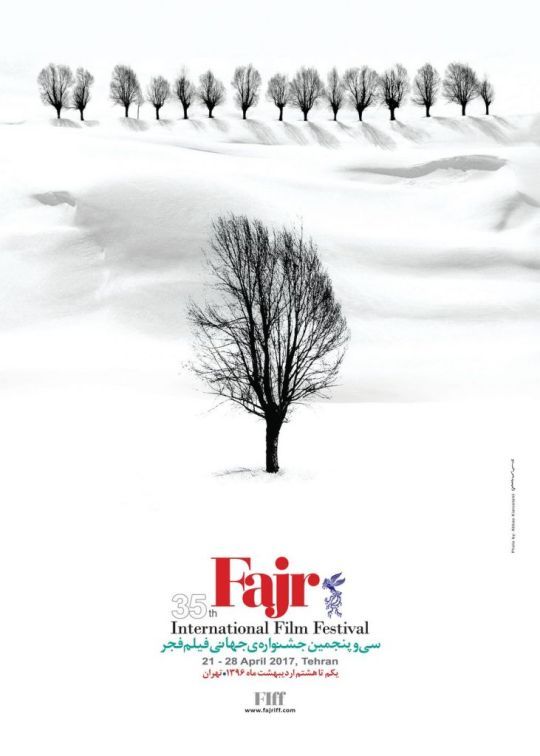
This is not the first time we turn our gaze to the cinema of Iran, yet it is the first time we actually had our own envoy in Tehran – we give you the 35th edition of Fajr International Film Festival as seen and instagrammed by Irina Trocan!
Starting with Abbas Kiarostami’s 1987 WHERE IS THE FRIEND’S HOME? / KHANE-YE DOUST KODJAST? (1987) and leading up to Asghar Farhadi’s THE SALESMAN / FORUSHANDE (2016), Iranian cinema has enjoyed great visibility abroad. Since there are strong similarities between many of these films, it even comes across as a unitary style, a national school, with Kiarostami as a mentor and Jafar Panahi as one of the most prominent representatives working today. These films are dramaturgically subtle (and supple), intended to give a sense of the bigger picture of Iranian society, as well as custom, self-reflexive, and with obvious framing devices (observing adult behavior from a child’s perspective, driving through the city with different passengers, summing up a marriage in front of a judge – to refer to just a few high-profile Iranian films from the past decades).
However, as it is the case with many new waves and cinemas, the fragment of yearly production that is visible abroad is a small and misleadingly homogenous one, while the view from within the borders of Iran is radically different. Reza Mirkarimi, Director of Fajr International Film Festival, claims that there were 60 Iranian film submissions for this edition of FIFF, while the total number of films made within a year is even higher – reportedly, 90-100 features every year, with over 130 made between March 2016 and March 2017. The overall production (you guessed it) is trying to do many different things beside emulating Kiarostami and Panahi.
But I would like to properly begin by making a specification about the Fajr festival – the source for a potential confusion that took me the first two days of the festival to clear up completely. A couple of months ahead of the international festival, there is the national event where a larger number of Iranian films is being shown, some of which are only programmed during FIFF as market screenings in order not to affect their chances to have an international-festival premiere somewhere else. What is added with FIFF is, well, the “international” bit of the programming, a line-up of recent festival darlings from around the world. According to the festival regulations, the team is on the lookout for films “that seek justice, defend the oppressed and underline humane and moral values.” Since several of the titles in the selection are by now well-known, I believe it is useful to give an overall impression: Cristian Mungiu’s GRADUATION / BACALAUREAT (2016), Agnieszka Holland's SPOOR / POKOT (2017), Andrzej Wajda's AFTERIMAGE / POWIDOKI (2016), the Dardenne brothers' THE UNKNOWN GIRL / LA FILLE INCONNUE (2016), François Ozon's FRANTZ (2016). The listed films are all tempered social critiques, with most of them taking no sides, although I will say that SPOOR is – due to its ending, which I will not spoil – radically ecologist.
Some of the international films might have worked well as double bills, especially Kim Ki-duk’s THE NET / GEUMUL (2016) and Bulgarian filmmakers Kristina Grozeva & Petar Valchanov’s GLORY / SLAVA (2016). The former – appropriately named for its tightly knit narrative construction – follows a North-Korean fisherman, Nam Chul-woo (Ryoo Seung-bum), whose boat engine malfunctions and, before he knows it, he drifts to the coast of South Korea. Held in awe as the author’s one-off political film, it might after all be about something rather philosophical, like the blight of power and/or the hopelessness of an individual who is unlucky enough to get caught between the wheels of the social machinery. It is hardly more socio-economically precise than, say, Park Chan-wook’s OLDBOY / OLDEUBOI (2003).
In a concrete sense, the fisherman suffers from the strictness of the South Korean intelligence service – he is suspected of being a spy until he is proven innocent and falls into the hands of an agent who does not shy away from using torture to get confessions. Back in North Korea, after having endured a lot, the protagonist is suspected of having been seduced by capitalism with his brief glimpse of a better life, and this time he is a suspect to his own government. Bottom line is: do not get on the wrong side of people who can ruin your life in the name of higher order. Although the protagonist is a larger-than-life honest citizen (and would hardly be believable were it not for the actor’s restrained ferocity in facing his oppressors), several allegorical scenes in the film are pretty effective: Nam Chul-woo is left alone on a Seoul street and desperately tries to keep his eyes closed, to resist taking in images of capitalism and a different way of life than the one he made for himself. The souvenir he takes home from South Korea is so innocent that it only becomes ridiculous when authorities of his homeland classify it as “evidence.” In short, Kim Ki-duk convincingly constructs a negative world view, and there is definitely a lot of craft to how the misery keeps on coming, but it helps to be a pessimist from the start to get on his wavelength.
In GLORY, a stuttered railway worker finds a pile of money on the train tracks and decides to hand it over to the authorities, and his honesty similarly does him in. Before he knows it, he is stuck between, on one side, the Ministry of Transport (they hold a public ceremony in his praise but otherwise neglect to pay him the previous months’ salaries and “award” him by giving him a watch while losing the better one he had already) and, on the other side, the press. The protagonist finds sympathy with a journalist for the way he has been mistreated by the Ministry, but is soon abandoned again and further abused by the Ministry for being a snitch. Again, the story, inspired by actual events and co-authored with screenwriter Decho Taralezhkov, strikes a chord for viewers who are cynical about social order in Eastern Europe – a temptation that is truly hard to resist, especially with the majority of us who work for neither the government, nor the press, and are forced to passively observe as everything goes awry. There are several fine touches in GLORY – for example, Stefan Denolyubov handles his character’s speech impediment as just one element of his life-long aloofness. He never thought to claim his rights before, and when he finally dared to do it, he discovered he does not have the necessary skills. The ceremony in his honor makes for a well-scripted scene: it is mostly a PR show of Ministry insiders, directing an extra to make the Minister look good on stage.
Since I had heard of what Iranian films are not allowed to show (kisses, nudity, women’s uncovered heads, physical contact between male and female performers who are not married in real life) I must admit I was curious as to how these restrictions applied to foreign films, since they did not need to respect them from script development onwards. By themselves, THE NET and GLORY, which I had not seen before FIFF, gave me an introduction to what censorship looked like. A woman wearing (what seemed to be) a sexy red dress in THE NET had her silhouette completely blurred out. Another woman, this time in GLORY, quietly sitting in the background and showing somewhat of a cleavage, had an extra patch of blurred pixels added on top of her blouse. Naked women’s legs (but not men’s legs!) were also hidden. To me, paradoxically, these edits rather had the effect of drawing attention to details that would not have seemed erotic in an unmodified shot. Festival films are less regulated to conform with morality than those aimed at a larger audience, and earnestness could not have been unflinchingly observed as the programmers selected Werner Herzog’s SALT AND FIRE (2016), but it seems to still be hard to find films that do not need edits.
The most moving film I have seen was Rithy Panh’s EXILE / EXIL (2016), which continues the endeavor of his THE MISSING PICTURE / L'IMAGE MANQUANTE (2013) of retelling recent history, for which no official image archive exists. A poetic reenactment of human suffering in late 1970s Cambodia (then known as Democratic Kampuchea), it takes place entirely inside a hut (or, more precisely, a theatrical set resembling it) and has a sole character – a nameless, quiet young male, whom one might suspect of being the filmmaker’s alter ego. The space is versatile enough to gain cosmic dimensions – a cardboard cut-out of the moon and a flock of menacing seagulls appear on occasion, hovering over the protagonist’s head, the floor magically morphs into a field or a patch of grass.
One scene is a leveled-surface reenactment of a Sisyphean task: as the man rolls a boulder from one wall of the room to the other, another boulder appears (through a cross-fade) where the first one had been. There are biographical allusions in the film, including a picture of a woman we assume to be Rithy Panh’s mother – but it all builds up to an essay film of life in poverty and isolation rather than anything more narratively precise. Close-ups of the protagonist eating an insect, or a chicken that does not come in ready-made crispy nuggets, remind viewers that basic survival is historically not a timeless, universal human right. The soundtrack is made up on meditations on exile that are no less devastating for being abstract – from thinkers and artists (Karl Marx, René Clair) to political leaders (Ho Chi Minh) – and their rapport to the image is always loose, engaging spectators in a poetic guessing-game.
Turning to even more recent history, Fajr IFF had a section of (mostly Iranian) films and documentaries, grouped in the section Broken Olive Trees. Among them was THE DARK WIND / REŞEBA (2016), an Iraqi-German-Qatari coproduction, directed by Hussein Hassan, about a Yazidi woman who escapes after being captured by the Islamic State but upon returning to Kurdistan is rejected by the family of her fiancé for losing her honor. Majed Neisi’s THE BLACK FLAG / PARCHAM E SIAAH (2015) documents the frontline of an Iraqi offensive against ISIS. I have unfortunately missed them due to conflicting scheduling, but I am still hoping to catch up with them somewhere else – they have been previously screened in the Stockholm International Film Festival and Busan, and Visions du Réel, respectively.
Going back full-circle to the Iranian films, let me state again that I was surprised by the diversity of their influences, though I would not necessarily say that all of them bring the influences to a cohesive whole. Fereydoun Jayrani's ASPHYXIA / KHAFEGI (2017) is a bleak film about a nun which might have gotten tricks on how to light somber interiors from Paweł Pawlikowski's IDA (2013). The nun, also facing dilemmas about her future, takes care of a sick woman gone mute who seems to be repressing something about her marriage, so there is a hint of Bergman's PERSONA (1966) in it, too, or is it George Cukor's GASLIGHT (1944)? Sadly, the narrative seems to switch to something else every time a certain element becomes interesting. Rambod Javan’s NEGAR (2017) entangles an investigation, fast-paced chases, the main female character’s rich-girl fascination, and several where-did-this-come-from dream sequences is frustrating in a similar way.
The purest genre film I saw (admittedly missing many, including the top-prize winner, Asghar Yousefinejad's 2017 directorial debut THE HOME / EV) is Alireza Davoodnejad’s FERRARI (2017) – it is mostly a city-traffic road movie featuring a girl whose interests are definitely less than spiritual (jewelry and expensive things in general, plus the eponymous rarity on wheels) and a driver who sees her defencelessly wandering around and has the chivalry to help. Moralizing overtones are hard to miss, but both characters are lively and their obstacle course is sufficiently engaging, although the end goal is by anyone’s perspective rather frivolous (the girl wants to find the Ferrari and take a photo with it to spite a friend), there is enough going on to maintain the suspense.
Certainly, there is a lot more to discover than I could have possibly absorbed in a week – especially since, being in Tehran, it was hard to resist the temptation to wander away from the cinema. Despite the Abbas Kiarostami poster exhibition, commissioned by the festival in his memory and lining the hallway of the Charsou cinema, a large part of recent Iranian production was less familiar than I had expected. I left the festival with the commitment to watch out for films that might otherwise fly under my radar – aside from the promise to fly back to Iran to visit Shiraz, and the Instagram handles of several of the Iranians I have met.
#Fajr IFF#FIFF35#Stockholm IFF#Busan IFF#Visions du Réel#Iranian cinema#Abbas Kiarostami#Reza Mirkarimi#Kim Ki-duk#The Net#Kristina Grozeva#Petar Valchanov#Glory#Stefan Denolyubov#Rithy Panh#Exile#Hussein Hassan#The Dark Wind#Majed Neisi#The Black Flag#Fereydoun Jayrani#Asphyxia#Rambod Javan#Negar#Asghar Yousefinejad#The Home#Alireza Davoodnejad#Ferrari#festival report#Irina Trocan
2 notes
·
View notes